#home removals south london
Text

#home removals#business removals#international removals#international removals london#business removals london#home removals london#home removals south london#business moves south london#home moves south london#home moves#international moves#home to home removals#home removal service london#london removals#removals london#removals south london#removal services uk#home moving services uk#london moving services#international moving services#london moving#london moving home#london home moving#house moves#house removals#house removals london#flat moves#flat removals#one-bed flat move#studio flat move
2 notes
·
View notes
Text
here's the thing about charles dickens. [discussion of his antisemitism, misogyny, and racism ahead.]
his last, unfinished novel, the mystery of edwin drood, features helena and neville landless, heroic and sympathetic south asian (sri lankan, specifically) characters, and the racism they endure in an english town is relevant to the plot to the point where neville ends up falsely accused of murder. in the wake of the indian rebellion of 1857, dickens applauded the english brutality against "that oriental race," and called for genocide.
fagin is called "the jew" 274 times in the first half of oliver twist. an article in the jewish chronicle asked why "jews alone should be excluded from the 'sympathizing heart' of this great author and powerful friend of the oppressed." at first, dickens dismissed this, and claimed he was just being accurate about london's criminal makeup. but he was moved enough by eliza davis's letters to him on the matter that he halted the printing of the latter half of oliver twist so he could change the text and remove the antisemitic language therein.
dickens was an abolitionist who despised chattel slavery in the united states, and called emancipation a "moral duty." dickens didn't think black americans were intelligent enough to vote, and he wrote an entire character in bleak house who is a joke to be disliked and mocked because she'd rather oversee charity missions to help children in africa than be a proper mother and tend to her own family at home in england.
speaking of one's own family at home in england, dickens smeared his wife, catherine hogarth, publicly so he could justify separating from her and taking up with a younger woman. catherine hogarth was likely mentally ill, likely living with postpartum depression. she was also an author in her own right and loved her family dearly. her reputation never recovered in her lifetime from the claims he made about her. in dickens's novels, time and time again, from nicholas nickleby to david copperfield to our mutual friend to the mystery of edwin drood, men who menace and take advantage of vulnerable women are portrayed as the worst kind of villains, deserving of whatever grisly ends come to them.
charles dickens was both privately and publicly a raging asshole in many ways and the world would be worse off without him, because he wrote for bourgeois, comfortable victorians, the very people who so often failed to "think of people below them as if they really were fellow-passengers to the grave, and not another race of creatures bound on other journeys." in the same breath that he calls agnes fleming, who opens oliver twist as an unwed mother dying in a workhouse, "weak and erring," he dares to add that "i do believe that the shade of that poor girl often hovers about that solemn nook-ay, though it is a church." he calculated jo's death to the page in bleak house for maximum effect. but when he wrote of the orphaned crossing-sweeper, "dead, your majesty. dead, my lords and gentlemen. dead, right reverends and wrong reverends of every order. dead, men and women, born with heavenly compassion in your hearts. and dying thus around us every day," people listened.
i dedicated years of my life to reading him and studying him and thinking about him and writing about him and his novels. now, i turn to condemn him; now, i turn to justify him. i wish i had a time machine so i could shake his hand. i wish i had a time machine so i could publicly debate him. i wish i had a time machine so i could break his nose.
charles dickens gives me courage and hope. charles dickens makes me want to tear my goddamn hair out. he is everything i despise and everything i love about the victorian age in one; the term "a man of his time" ought to have been invented for him. the leaps and bounds the victorians made for progress in the public good are only matched in greatness by the extremity of their atrocities against their "fellow-passengers" on this earth. the way we think about nearly every modern social ill can be traced back to the 19th century; the way we think about nearly every modern idea of social justice can be traced back to the 19th century. every last one is writ large and small in dickens's novels. he and his age are the greatest contradictions in human history and that's why i can't shut up about them, ever, even when i am exhausted by them, even when i am inspired by them, even when it was two centuries ago and it shouldn't matter anymore, but it does. it always will.
#filthy victorians; they made me what i'm made of.#;swan has a word.#;the long nineteenth century.#;they who call the whole world brother.
8K notes
·
View notes
Text
────────────── sommer house // 1
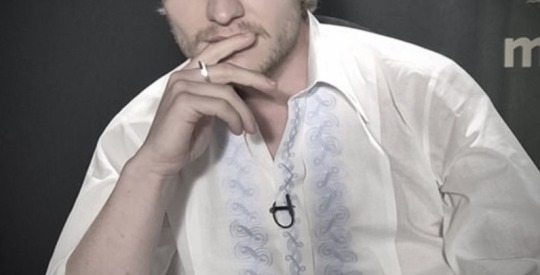
series summary: After starting a new job at a prestigious museum in London, you form a close friendship with Helaena Targaryen. You're surprised when she invites you to stay at her family's estate for the summer holidays. [1.7k]
[aegon targaryen x reader, modern!HOTD AU ]
masterlist
warnings: talk and description of bugs. if there's any I missed, let me know!
note: hello friends! I’m sure some of you might be a little confused seeing this coming up again. after much contemplating and many many re-reads, I decided I would rewrite what I had of moth to a flame now that I had more inspiration and motivation. for this first chapter, it’s not much different from my first draft but I removed and added a few things that I thought made the story begin flowing a lot better. thank you for the support and happy reading <3

Dashing through the rain, your coat pulled tightly around you, you navigate the bustling streets of London. The sky opened up as you were leaving the train station, drenching you instantly. You’re breathless when you reach the entrance of the museum, soaked to the bone with hair sticking to your forehead. Pausing briefly under the awning, you try to catch your breath, shaking off as much rain as you could before hurrying inside, the patter of rainfall fading behind you.
The familiar warmth and silence of the museum envelop you, offering a stark contrast to the chaotic weather outside. The lights are dim and if you listen closely, you could swear you can hear soft music permeating the air.
You make your way to the back of the museum, passing through employee doors and to the entomology department, where you knew Helaena would be waiting. Rounding a corner, you see you. She stands at the entrance of your shared office, a steaming cup of coffee in her hand. She leans against the doorframe, her free hand fiddling with the key card that hangs around her neck. It’s 5 past 9, you're not that late and her casual demeanour only makes for a comforting sight.
“Rough morning?” she asks, a grin on her lips as she entends the cup of coffee towards you.
“Don’t even get me started,” you reply, taking the cup and making your way past her into the room. “The tube was a nightmare. Some sort of signal failure. I’m surprised I made it at all.”
Helaena laughs, “You wouldn’t have to deal with the tube if you drove,” she teases, raising her eyebrows. Following you to your desk, she stands in front as you set your things down. You roll your eyes at her, making a face, to which she responds with a half-smirk.
You met Helaena three months ago when you first started working at the museum. After a seemingly endless job search, you happened upon one that just happened to be in a country halfway across the world. Seeing as how you fit all of the requirements, you pushed fear aside, taking a leap. You packed up what you could and made your way to London. The idea of working in another country had always captivated you, but the reality of moving hadn’t fully sunk in until you stepped off the plane. Everything felt surreal—the accents, the bustling streets, the historical buildings whispering stories of the past.
Working in the entomology department with Helaena, you spent countless hours cataloging and preserving the museum’s vast insect collection. The late nights became routine, often the two of you working late into the night, at times at each other's homes. Her companionship made the hours more bearable. Helaena quickly became more than just a colleague; she became a friend, someone you could rely on and share with.
Clapping her hands, a wide smile now on her face, Helaena turns to you from a large cluster of boxes: "Well, you're here now, and just in time; we've got a ton to do today."
Settling into your desks, surrounded by cabinets filled with specimens and shelves lined with books and equipment, the morning passes quickly.
You take turns pulling out cases from the large boxes, a new shipment from South America, examining and cataloging each specimen. Each one is carefully inspected, labeled and documented. The vibrant colors and intricate patterns never cease to amaze you, each telling a different tale.
As the afternoon rolls around, you find yourself leading a group of young school children through an interactive exhibit, one you spent the last week preparing with Helaena, explaining the life cycles of different insects and answering their curious questions. Their eyes widen as you show them the cases of insects, pointing out each of their intricate and unique features. Together, you carefully examine drawers of pinned needles, getting lost in the details of their iridescent shells.
The children nod as you explain different insects, jotting down notes in their small notebooks to bring back to school. Their laughter and curiosity makes the rest of the day pass quickly, their enthusiasm making even the most mundane tasks feel rewarding.
The day winds down from there, the absence of the children making you realize how tired you’d gotten. You put the exhibits back into their boxes, making sure everything is in its place for the groups coming in tomorrow and the day after that. From the corner of your eye you can see Helaena making her way to you, rolling a cart identical to yours. There’s a thoughtful expression on her face.
"So, any plans for the summer holidays? They're not gonna need us at all during these renovations they're doing," she inquired, pursing her lips at you.
You shake your head as you continue placing boxes onto your cart. “I would but I can’t afford to go home right now. I’ll probably just stay in London and explore the city or something.”
Helaena’s face lights up. “Why don’t you come with me to my family’s country estate? We’re having a big party for my dad’s retirement. It’ll be a nice change of pace and you can officially meet my family. They’ll adore you.”
Your lips part as you stare at her wordlessly. “Are you sure?” you asked, searching her eyes,
Helaena waves you off, “Of course!” she exclaims, shaking her head. “"It'll be fun. Besides, it would be nice to have another girl there so I don’t have to deal with my brothers all on my own. Say you’ll come," she pleads.
The thought of spending the holidays with Helaena, surrounded by the English countryside and her family’s hospitality, race through your mind. It sent a shiver of nerves through you. You knew very little about her family, only hearing of her brothers in passing. You’d seen them in pictures she had littered around her apartment and on her facebook. You met her mother, if you can call speaking to her briefly over the phone, one night that you spent the night at Helaena’s. Her older sister and her father were a complete mystery to you, both of them a subject she didn’t ever really talk about.
She bats her eyes at you, gently wrapping her arms around yours. You let out a sigh, breaking out in a smile. “Alright, I’ll come.” you laugh, and she throws her arms around your shoulders.
:・゚✧*:・゚✧
It's a few days later you find yourself tossing clothes at Helaena. The afternoon sunlight streams through the window behind her. Her hair is loose, falling in soft waves over her shoulders. It looks as if it were glowing. She sits on your bed, gingerly folding different shirts and pants into your bag. Rejected piles of clothes are strewn across your bed, shoes littering the floor and small packing cubes full of toiletries and makeup sit next to your gradually filling case.
“What about this?” you ask. Swaying slightly, you hold a dress up to your chest. It’s red and covered in polka dots with a large white bow cinching the middle. Her face stays in a slight grimace, shaking her head and laughing.
"We need to get you some new dresses; these look like they belong in a history museum," she says with a playful smile. You laugh, shoving her shoulder as you tuck the dress back into the wardrobe. She pulls a knitted sweater from the edge of your bed and tucks it tightly into your bag.
Once your outfits are sufficiently coordinated and your essentials pulled into packing cubes, Helaena helps you pack them into your suitcase, ensuring you have enough of everything you need for your stay. She speaks up when you struggle with the zipper.
“So, I know you’ve sort of met Mum and you’ll be meeting everyone else while we're there. My sister is even coming with her children. A fair warning, though having everyone there can be a bit … intense but they’re good people.”
You note her hesitation. “Intense how?”
Helana shrugs, trying to downplay her words. “It can get a little overwhelming, is all. But you’ll be fine, don’t worry.”
You nod an ok at her, climbing on and bouncing on your suitcase to press it shut with your knees. She joins you, twisting with you as you begin to pull on the zipper.
"The place’s been in my family for generations. There’s lots of history there, places you could get lost in. You’ll really love it.”
You struggle for a little bit, pulling the zip a little more to fully close the case before sitting on it, breathless.
"What was it like, growing up in a place like that?" you ask, looking up at her as she takes her spot back on the edge of your bed.
Helaena smiles, a distant look in her eyes. It's a smile that has a drop of sadness behind it. "It was magical. There are all these secret passages and hidden rooms. We used to play hide and seek for hours.”
She traces a pattern on your quilt as she continues speaking. “We each got puppies at some point and when we’d pretend we were princes and princesses, my brothers would pretend they were dragons.”
There's a bittersweet expression on her face as she recounts the memory. It's not an expression you're used to seeing on her face but it’s one she seems to fall back to every time she speaks of home. You can’t help but to be curious about it but you always stop before prying or saying anything. You smile, reaching out a hand and placing it on her knee. It pulls her out of her momentary daze and she flashes a smile at you. A mixture of nerves and anticipation fill you again. "I can’t wait," you say with a soft sigh.
Helaena looks at you, her eyes sparkling. "You're going to love it. It’s like stepping back in time. Just be prepared for a bit of drama; there’s always something happening when we're all together."
"Drama?" you ask, raising an eyebrow.
"Yeah, you know, family stuff. Arguments, misunderstandings, that sort of thing. But it’s all part of the charm," she says with a wink.
You laugh, feeling a bit more at ease. "Well, I’m ready for anything."
With the suitcase finally zipped, you both collapse onto the bed, giggling. Helaena turns to you, her expression softening. "I’m really glad you’re coming. It’s going to be a summer to remember."

If you want to support my writing you can buy me a coffee over on Ko-Fi <3
168 notes
·
View notes
Note
can you do a millie bright x reader where it’s their wedding day and the whole team are there and it’s just really fluffy and cute:). love your writing so much
Tears of Joy

Millie Bright x reader request
-> Marrying the Love of your Life
-> sorry for the delay - I hope you like it!
➳ Masterlist
•─────⋅☾ ☽⋅─────•
After waiting and planning for months on end – maybe even your entire childhood, the day was finally here. You were getting married!
Sure many dreams from your childhood wedding plans came true, but you didn’t quite find a prince charming, more of a princess charming – your very own knight in shining armor, the one and only Millie Bright.
As soon as you hat met Millie all those years ago in a Social Media meeting for Chelsea, you knew that she was the one. But the gentle giant had been quite scared to come up and talk to you – so you had to take the first step.
While the blonde looked intimidating it only took speaking to her once to see that she really wasn’t – maybe more so on the pitch, but luckily you didn’t have to face her there.
Millie had blushed a deep red when you caught her arms as she frantically tried to leave the meeting room, something you had not expected.
“Hi Millie, would you like to go on a date with me?”
Of course, she knew who you were, the new head of media for the women’s branch of Chelsea and she had spent the last four meetings just staring at you.
While you had felt confident walking up to her, seeing her face contort into a frown and lines appear on her forehead changed your mind quickly and you removed your hand.
“Or not – sorry that was a stupid idea.”
She couldn’t pull you in a hug fast enough. Dear god. If she hugged you like this, you never want to hug another person.
“I wanted to act cool and act like I wasn’t sure… But I would love to!”
To this day Millie and you could laugh about how much more stressful it had been than it needed if she had just said yes immediately.
---
---
While you had taken the first step to dating, Millie had been the one to ask the big question. She had just come home, even though she had been at home the entire time, from winning the Euros – and emotions were at an all-time high. Your girlfriend was now officially the champion of Europe.
You had been the first person she had seen out of the stands, her parents pushing you forward when you wanted to let them go first, after all, she was their daughter. “Don’t be silly love!” Had been what her mother said once she saw the blonde making her way towards the barriers.
“I did it, Baby! I fucking did it!” She was in tears, face still hot from running on the pitch for such a long time as she pulled you into a passionate kiss, not caring the slightest about all the cameras.
“You did so well my love! I am so proud of you!”
She would never forget the look on your face – she had never seen you look so proud of anybody, and now you looked at her like this. Her heart? Melted into a puddle.
Your girlfriend didn’t wait for long, lifting you over the barrier and pulling you as close to her as she could.
“My god Mills, leave some for me!” It was Rachel who finally pulled her sweaty best friend off you, just to replace her, giving you a bone-crushing hug.
“Off Rach! That’s my girl! Get ya own!”
The ‘DalyBrightness’ duo had always playful banter between them, and you were no stranger to it either, often getting roped into it somehow by Rachel, determined to get Millie angry – but the taller one of the two could only laugh about it every time.
The whole evening and night was spent partying, first in the dressing rooms, then in a chosen location with friends and family. Trafalgar Square was the next destination, where the girls would meet the nation they had made so incredibly proud, just the evening before.
After all the meetings and interviews had finally calmed down, you got your girlfriend back. Millie had finally arrived at home, in your shared south London house and the first thing she saw was your dogs Hera and Zeus. But upon lifting her head, the defender saw that they flanked both of your sides, while you held a beautiful ‘Welcome Home’ cake in your hands.
She couldn’t kiss you fast enough after seeing your nice gesture and cute smile.
“I love you much my love, and I don’t think I tell you enough. But I really do.”
The first thing you did after not seeing each other for such a long time, was napping. In the big bed, ready to sleep the day away. What you didn’t know, was that Millie woke up way before you and found herself staring at a beautiful ring in a little box.
Today was the day.
After making dinner she had asked you. She didn’t go down on her knees, so she pulled out a box, opened it, and just sat there for a second until you finally turned and noticed the ring.
“Mills?”
“Marry me?”
Choked up on tears you couldn’t do anything but nod. “Yeah, baby. I’ll marry you.” The kiss that followed tasted like tears, tears of utter joy as Zeus and Hers ran through the room yapping as if they knew what had just happened.
---
---
The day was finally here. Yours and Millie's wedding day. In retrospect you could not have chosen a better day, even if you obviously had not known how the weather would be – it was perfect.
Getting ready was a long process, not even physically, but rather mentally. But there was not a single doubt in your mind, that you would marry the love of your life.
You were ready when a knock sounded at the door and your sister who at the same time was your maid of honor opened it. The door was only open a smidge so you couldn’t really see who was behind it, while you talked to your bridesmaids.
“It’s go-time people!”
Your heart fluttered. But you were not nervous or anxious, no. You were excited and nearly ran out of the room with the bridesmaids to get to the altar, but your sister stopped you in your tracks, insisting that you had to wait somewhere else until the rest of the wedding party walked down the aisle.
Now stood in a room you waited for your sign. Fuck. Now the nerves were coming up. In your head, you went through the plan again, when you heard someone clear their throat.
It was Millie. There she was, dressed in a gorgeous white jumpsuit – looking at you like you hung the moon. “Baby! “You cannot see me in my dress before the wedding!”
Tears brimmed in both your eyes as you stared at your fiancé who couldn’t keep standing there any longer, so with brisk steps the blonde rushed forward and engulfed you in one of your favorite hugs. Your hearts find each other and beat in unison.
“How are ya feelin?” She rested her forehead on yours while staring at you as long as she could. “Nervous. Excited. Incredibly happy.“
The music inside was slowly getting quieter and you knew that you didn’t have that much time left. “I thought we could change the plan a little.”
Turns out Millie's idea was brilliant. Instead of just you walking in, both of you walked in together, no one would give anyone away. This would be a union of love between you and her, but that didn’t mean that either of you had to say goodbye to your family.
You could hear the gasps as you walked down the aisle, arms hooked together, each of you a flower bouquet in hand, the biggest smiles anyone had ever seen on your faces. You looked magical.
---
---
In the end, you don’t even know how you got through the vows, all you remember were a lot of tears, and an incredibly passionate kiss that was met with screams of joy from the audience.
After all of your families had congratulated the both of you, your Club mates made their way towards you each of them with big smiles on their faces.
Niamh was the first at your side and was the first to pull you into a warm hug. “You look like a princess. But one of those badass ones, that doesn’t need a white knight to save them.”
“I will need a cheaper ring for daily use, this one belongs in a bank in a safe deposit box.” Millie's joke was met with a lot of laughter as Sam came over and after hugging you as well, took a closer look at your ring. “Maybe! That is a fucking rock Mills!”
„You’re one to talk.“ Hempo received a slight nudge from her captain while everyone else laughed along.
One after the other Chelsea and Lioness teammates alike made their way through the masses, hugging you with congratulatory tones and singing praises. Most of them even brought presents which they gave your sister for safekeeping.
“I can finally call you my wife.” Millie had stolen you away from the open space for a second and pulled you close for a deep kiss.
“My wife, huh? That has a nice ring to it.”
Not only were you her wife now, but she was also yours. Married. Oh dear god, you were finally married to the girl of your dreams. “Best day of my life.”
“Then I am excited to give you better ones.”
“God. you disgust me.” Neither of you had seen Rachel invade the nice little space Millie and you had created for the two of you
“Rachel!”
#woso x reader#woso imagine#woso#woso imagines#engwnt x reader#lionesses x reader#millie bright x reader#millie bright#chelsea wfc x reader#chelsea wfc
297 notes
·
View notes
Text
The Best News of Last Week - June 13, 2023
1. U.S. judge blocks Florida ban on care for trans minors in narrow ruling, says ‘gender identity is real’
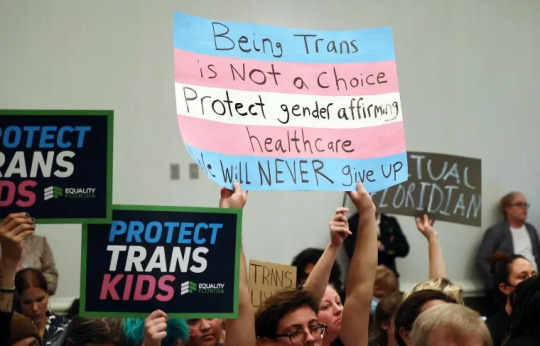
A federal judge temporarily blocked portions of a new Florida law that bans transgender minors from receiving puberty blockers, ruling Tuesday that the state has no rational basis for denying patients treatment.
Transgender medical treatment for minors is increasingly under attack in many states and has been subject to restrictions or outright bans. But it has been available in the United States for more than a decade and is endorsed by major medical associations.
2. Eagle Who Thought Rock Was an Egg Finally Gets to Be a Dad

A week after their introduction the cage where the little eaglet was put, was removed so the two could interact more closely. When they were given food, a whole fish for Murphy and bite-sized pieces for his young charge, rather than each eating their separate dish, Murphy took his portion and ripped it up to feed to the baby.
3. Little penguins to reclaim Tasmanian car park as city-based population thrives
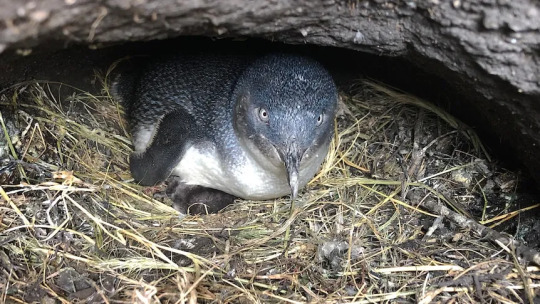
Not far from the centre of Tasmania's fourth largest city, a colony of the world's smallest penguins has been thriving, and their habitat is about to expand into an existing car park.
The bright lights and loud noises of Burnie have not been a deterrent for hundreds of penguins who set up home on the foreshore in the north-west Tasmanian city.
4. Latest population survey yields good news for endangered vaquita porpoise

The resilient little vaquita marina appears determined to survive the illegal fishing that has brought it dangerously close to extinction, according to the latest population survey. Despite an estimated annual decline of 45% in 2018, the endangered porpoise appears to be holding steady over the last five years, according to a report published Wednesday by the International Union for Conservation of Nature.
5. 'Extinct' butterfly species reappears in UK

The species, previously described as extinct in Britain for nearly 100 years, has suddenly appeared in countryside on the edge of London. Small numbers of black-veined whites have been spotted flying in fields and hedgerows in south-east London. First listed as a British species during the reign of King Charles II, they officially became extinct in Britain in 1925.
This month they have mysteriously appeared among their favourite habitat: hawthorn and blackthorn trees on the edge of London, where I and other naturalists watched them flitting between hedgerows.
6. Colombian is a hero in Peru: he rescued 25 puppies that were about to die in a fire

During a structural fire that occurred in a residential area of Lima in Peru, a young Colombian became a hero. The Colombian, identified as Sebastián Arias, climbed onto the roof where the puppies were and threw them towards the community, that was waiting for them with sheets and mattresses. "I love them, dogs fascinate me," said the young man.
7. World-first trial for pediatric brain cancer

Researchers in Australia are conducting a world-first clinical trial for children diagnosed with ependymoma, a rare and devastating brain cancer. The trial aims to test a new drug called Deflexifol, which combines chemotherapy drugs 5-FU and leucovorin, offering potentially less toxic and more effective treatment compared to current options.
Ependymoma is the third most common brain tumor in children, and current treatments often lead to relapses, with a high fatality rate for those affected. The trial, led by researcher David Ziegler at the Kids Cancer Centre, has received support from the Kids with Cancer Foundation and the Cancer Institute NSW. The goal is to find a cure for every child diagnosed with ependymoma.
----
That's it for this week :)
This newsletter will always be free. If you liked this post you can support me with a small kofi donation:
BUY ME A COFFEE ❤️
Also don’t forget to reblog.
SUBCRIBE HERE for more good news in your inbox
606 notes
·
View notes
Text
this was supposed to be a little Price thought but it got away from me and it's 1112 words
warnings: fem!reader who's decided kids aren't the best idea for her, mentions of sex and breeding kink, brief mentions of a disordered relationship w/food

“Are you still planning on children?”
It takes John a minute, in the post coital haze, to understand the question his wife whispers from the bathroom doorway, naked in the easy way of years together.
She stands there, skin reddened in the places he was just holding onto like a lifeline, and she looks at the towel in her hands instead of him. It’s steps, between them, but they turn to ice for John, a little Siberia in the middle of South East London.
“Loaded question, isn’t it, love?”
“You brought it up,” she breaks the frost, moving to settle on the edge of the bed, right next to him. Her towel is warm, he realizes, as she works it over where he’s drying itchy with sweat and cum. Barely wet and gentle on his skin.
And John knows what she means, can still feel the words on his tongue: I’ll fill you, love, fill you ‘till it takes. He doesn’t regret them, doesn’t want to regret them because it gets him there in record time, does the job so well for him that just thinking about them has his cock hardening again to the warmth and the wetness and the subtle pressure of her hands.
But that’s all it is, a fantasy that ends here, when he cums. He doesn’t spend his days imagining his wife pregnant in his daily life. In fact, now that he thinks about it, the thought’s strange, leadens his stomach with an irrational sort of anxiety. He spends too much time away, too far removed from this unstoppable woman, to think of her vulnerable and not feel a certain kind of madness tugging at the threads of his self control.
“Do you want children?”
He counters, buys time, though he knows it’s unfair to twist the question on her. They talked about it, once, before the marriage, when they felt younger and the future seemed so terribly malleable. John said it might be good to have a couple. But he didn’t want to be a Christmas dad, seeing his offspring every four to six months and have them cry in his arms because they don’t recognize a man who’s more thought than father to them.
He’d planned to retire, cut back at least, before he’d consider any children. And now he can’t, not with so much to do. He couldn’t sit by a desk and watch other people forced into the kinda shit only he —and Kyle and Soap and Simon— will voluntarily sign up for. So it’s looking more and more like it might not happen for him, and he’s comfortable with that.
But they’d agreed, back then, on an indefinite but small amount of kids. And now his wife, the one with an actual life and a home where she welcomes him, is not looking at him as he refuses to answer. Not until he hooks his fingers in the crook of her knee and smooths his thumb over her thigh. She sighs at the touch, leaves the towel in favor of drawing nonsense patterns over his stomach.
“I don’t think it would be a good idea for me to have children, John”
He frowns, but waits in silence. There’s something sad hiding behind the fleeting smile she gives him, something guilty that makes him brace himself for movement. The impulse he’s felt since the moment he fell in love with her, to fight for her, against the world. Like he’s an attack dog, built for violent resistance in her name.
“My body feels off, some days, like I don’t belong in it. I skip breakfast sometimes, I leave the metro a station back, for the walk.”
Her voice is soft, but her eyes are unrelenting, now that she’s started. And she rushes through the admission, makes it a simple stating of facts, like making the shopping list.
“I don’t think I can survive having someone else in this body without hating them, and a baby doesn’t deserve that. I don’t deserve that. I’m sorry.”
John’s heart balloons in the quiet of the moment. He can’t help the lopsided smile that tugs at the corners of his mouth, which he realizes isn’t a reasonable reaction. But it’s this, the clarity and the unflinching honesty, why he adores her so completely.
Whatever ache is in the confirmation of closing this particular door, outweighed by the pride of knowing she trusts him with the naked, uncomfortable truths of her. And that, John supposes, is what burns at him and he doesn’t know how to put into words when he talks about filling her up, when he thinks about breeding, in the most primal, basic sense of the kink. He just wants to make himself a part of her, wants to know her to the last little cell and live in the spaces between them.
“So if you want to have children, I think we would have to consider other options.”
That comment brings John’s focus snapping back to her hands, to the way she spins her wedding band, tugs on it until it hits the speed bump of the knuckle, a gesture he isn’t sure is conscious but that telegraphs exactly where her head is at.
“You’re all I want, love. No hypotheticals.”
“John—“
“No,” he catches her hand, pulls it back to his chest. He uses it to anchor himself, sitting up to kiss away whatever objection she’s cooking up. “I don’t say what I don’t believe in, right?”
“Right,” her stance slackens and her body tilts forward so her torso slots against his, a perfect fit.
“Won’t bring it up again, love.”
“I like it,” it’s a mumble against his neck, his jaw, that turns into kisses that follow the line of his beard. “Just wanted to let you know, in case—“
John simply hums, keeps the groan in his throat, the one she likes best; because however tempting her sweet weight is on him, he’s weighing his options for breaching the other touchy subject this impromptu conversation raised, on a cold morning in the middle of his first week home in a while.
“About the eating—“
“I have it handled,” she says, stretching and twisting until her legs end up on each side of him again, "I'm trying."
"Ok. But you'll let me know if you need something from me, right?"
She nods, pulls back from him just to grin like she's misbehaving, or just about to.
"Could I have another round for now?"
And John laughs against her until she's squirming at the feeling of his whiskers on her skin, 'cause how could he ever deny his favorite girl.
#m: cod#r: fluff#captain john price x reader#personal#i'm actually sort of nervous about posting this#cause i feel like the fandom at large has decided Price is a dad™ and the thought of him not having biological children#and by choice no less is an unpopular opinion
75 notes
·
View notes
Text
A (long) Collection of TTOI Quotes
He’s as useless as a marzipan dildo
I’m going to have to mop up a hurricane of piss here
He and Hewitt are tight as arse cheeks
‘How fucked am I? On the fuckometre?’ ‘Oh 12’ ‘yeah 12’ ‘out of what?’ ‘50’ ‘oh…. mine was out of 10’
Tiny little dick the size of a bookie’s biro
There’s no time to go home I’ll pass myself on the way back in
I can only cook with what I’m given. You give me Hugh Abbot I’ll give you bangers and mash, you give me Jerry from home office then I can raise it to fucking risotto and scallops
I am king of remembering my own password
‘Shagging your way to the top is it?’ ‘Yes well I’m not Scottish so I’ve got to get in somehow’
How much shit is on the menu and what flavour is it?
‘What do you want Malcolm’ ‘Two bits of tit. Two titties.’
Come the fuck in or fuck the fuck off
“What about just firing him at a wall from a cannon?” “I know we force feed him a mixture of garlic and Dettol in cup a soup” “What about the old red hot poker up the arse?” “I’d like to nail him to a tree through the head and watch lice slowing crawl over his body eating off all the flesh”
“Has security checked this [plant]?” “For little terrorists?”
This is the problem with the public - they’re fucking horrible
Not only was it a shit idea to ruin my holiday, it was a shit idea you stole from the government to ruin my holiday
Ah that’s like smoking dead skin that is
You’re the fucking shittest James Bond ever - you’re David Fucking Niven!
You’re like a sweaty octopus trying to unhook a bra
You take the piss outta [Al] Jolson again and I will remove your iPod from its tiny nano sheath and push it up your cock! Then I’ll plug some speakers up your arse and put it onto shuffle with my fucking fist
Ithought you said no one reads these except political obsessives and mad Christians in wheelchairs but loads of people read mine
“I am not the story here” “Well no you kind of are though Malcolm, they spelled your name right and everything”
Come with me before I put your nuts in a book and squeeze them so hard that they come out like pressed fucking flowers
You’re The Ben….Ben Nevis…Bentally Ill…
Tickety fuckity boo
“Anyone seen Jamie?” “Oh don’t tell me he’s gone feral cos he was fucking terrifying when you had him on the leash.”
I’d love to stay and talk to you but I’d rather have type 2 diabetes
Mr Baby New Potato Head
It sucks cock so deep the bell end is wearing your appendix as a little hat
This is an operations room so unless you want your tonsils out by keyhole surgery from this key here, piss off!
Cliff Fucking Lawton! Nice. Was the Cilit Bang man not available?
To a guy who loses it so bad he needs a sat nav to find his own nipples
I’m feeling about as up to date as a Gregorian calendar
“You couldn’t organise a bum rape in a barracks.” “Au contraire”
You’re about as secure as a hymen in a south London comprehensive
Stop fucking blinking or I will take your optic nerve and fucking strangle you with it
Hanging round like a couple of school secretaries in the summer holidays
It’s like a prostate consultant’s waiting room in here
You will be sorry you inflatable cock!
I am going to have your intestines as a skipping rope and your lungs sundried and turned into a fucking waistcoat
Or will Dan Miller pull his scalp off and use it as an oven glove?
Enough of the pleasantries let’s just oil up and get fucking
A towel rail shouldn’t take up a whole wall, that’s not a towel rail it’s a climbing frame.
I’ve got a to-do list here longer than a fucking Leonard Cohan song
More on my plate than a spinster at a wedding
The only other candidate is my left bollock with a fucking smiley face drawn on it
Feels a bit like my head’s made entirely of smoke alarms
Fuck the Is and fist the Ts
May as well ask what I think of skirting boards, I’m sure we need them but I don’t know why
“No no I didn’t say that” “Well you sort of did with your face”
Let me row back a little bit, perhaps all the way back to the boathouse
She’s not bent either in the sense of being corrupt or being gay and by the way that’s an incredibly homophobic headline you massive poof
Omnishambles, from bean to cup you fuck up
I’m on my way to wipe my arse on pictures of Nick Robinson
“And I’m not doing terribly am I?” [Malcolm looking out the opposite window] “I love the way they’ve sandblasted here. It looks so clean.”
No no, don’t get up - I’m not viagra
He’s a fucking knitted scarf, he’s a balaclava.
The only thing John Duggan is doing here is depriving a village somewhere of a twat
You write almost entirely in generic meaningless buzzwords don’t you?
I will tear your fucking skin off, I will wear it to your mother’s birthday party, I will rub your nuts up and down her leg while whistling Bohemian Fucking Rhapsody
She’s behaving like a squirrel in a pedal bin.
Or I’ll have to tear my eyelids off and scrunch them up into fucking earplugs
I’m flypaper for dickheads
I think you’re wrong Malcolm you’re like a sultana in a salad
Sorry I can’t make espresso but I’ve made this so thick and black it’ll be like drinking fucking plimsoles
Well fuck a pot noodle. Sam, prepare my horse. I ride to DoSAC
The only fucking vibe you need to worry about is the one your wife hides in her knicker drawer
See you later and remember my door is always locked
* Tintin’s sexy sister to Ollie
What I really need is to shoot you all in the back of the head FUCK FUCK FUCK FUCK. but I can’t because it’s illegal.
I reserve this level of anger for when I’m flying Ryanair
As about a strong defence as ‘the fertiliser in my homemade bomb was organic’!
She’s a fart in a frock and we both want her wafted out of here
She’s going to have to fall on her sword, which means that we’re going to have to stick one in the ground, trip her up onto it and get someone jump up and down on her back for ten minutes
She’s going to kick her own head in which’ll be easy because she does yoga
I’m looking for Mr Oliver Reeder? He looks a bit like a Quentin Blake illustration
“Is she fucked?” “Like Caligula’s favourite watermelon.”
Can I bring you a shot glass? And some bleach?
You can’t look a gift corpse in the mouth
“It’s over the fat lady’s singing” “No she’s not, the fat man from the go compare advert is talking”
I’ve got my cock out, it’s covered in breadcrumbs and the fucking pigeons are circling
Have I just stepped through a portal into a sausage machine because this is making mincemeat out of my head
Sit there and ogle me like a page three girl
I’m as busy as a two-twatted hooker
Now I have to step in your shoes but after you’ve shat in them
I don’t just take this fucking job home you know. I take this fucking job home, it ties me to the bed and it fucking fucks me from arsehole to breakfast then it wakes me up in the morning with a cupful of piss lung in my face then slaps me about the chops to make sure I’m awake enough to kick me in the fucking bollocks. This job has taken me in every hole in my fucking body.
Everything is fine I’m like lube at a funeral
If you pull off again I’m going to stick the meter so far down your throat you’ll be able to tell the price of your next shit
You closeted regency homosexual
It’s been a bit like renovating an old, old house. You can take out a sexist beam here, a callous window there, replace the odd homophobic roof tile, but after a while you realise […] the foundations are built on what I can only describe as a solid bed of cunts.
Shit in the couscous
#these should be in order because I kept the list as I went through my rewatch#my own post#the number of these I quote on a daily basis#the thick of it#ttoi#malcolm tucker#jamie macdonald#ollie reeder#hugh abbot#glenn cullen#terri coverley#nicola murray
40 notes
·
View notes
Text
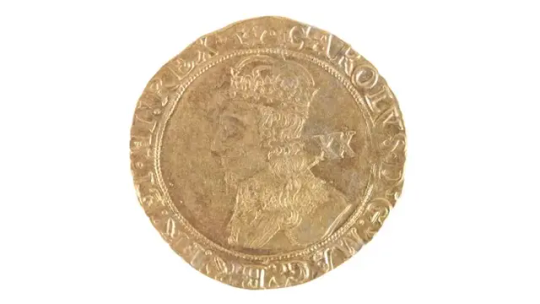
Hoard of 17th-Century Coins Hidden During English Civil War Found
During a kitchen renovation, a family in England unexpectedly discovered a hoard of coins that was likely buried for safekeeping during the first English Civil War.
A family in England discovered nearly 400-year-old buried treasure during a recent home renovation project. The find includes more than 1,000 gold and silver coins that were likely hidden during the first English Civil War.

Betty and Robert Fooks unexpectedly unearthed the 17th-century hoard at their cottage in South Poorton Farm, Dorset, in 2019. Now, these coins have hit the auction block and sold for upward of $75,900 (60,740 British pounds), according to the hammer prices listed by Duke's, an auction house in Dorchester that handled the sales.
Robert Fooks made the discovery while pickaxing the kitchen floor to remove about 2 feet (0.6 meter) of flooring material, including modern concrete, old flagstone and bare earth. Then, he saw a broken glazed-ceramic vessel brimming with coins in the layer of soil dating back about 400 years. It's unclear if the bowl was broken before or during the recent discovery, according to Duke's.
The couple contacted a local finds liaison officer, who arranged for the coins to be sent to the British Museum, where they were cleaned and identified, according to The Guardian. The British Museum noted that the coins were likely deposited on a single occasion between about 1642 and 1644, dates likely based on the coins' mint dates.

The coins in the collection, named the Poorton Coin Hoard, range from modest sixpences, which were worth six pennies, to a coveted gold "unite" coin that was worth 20 shillings, or 1 pound, and depict the visages of English monarchs Edward VI; Mary and her husband Philip; Elizabeth I; James I; and Charles I, who ruled successively from 1547 to 1649.
Many of the coins sold individually or in groups at auction on April 23. A single gold coin of Charles I brought in the highest price, at 5,000 British pounds ($6,260), while some lots went for far more than their estimated value.
The period in which the coins were likely hidden — 1642 to 1644 — coincides with the first English Civil War, which lasted from 1642 to 1646. The three civil wars were fought between supporters of the English monarch, then Charles I, and Parliament, to determine the balance of power between the crown and Parliament.
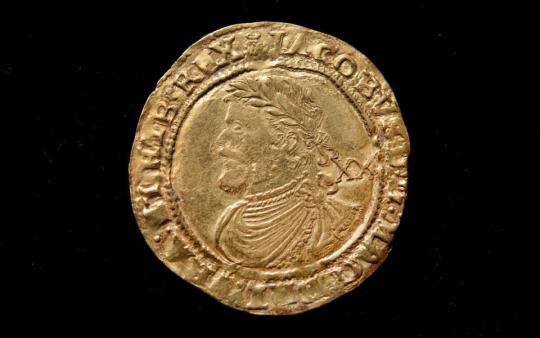
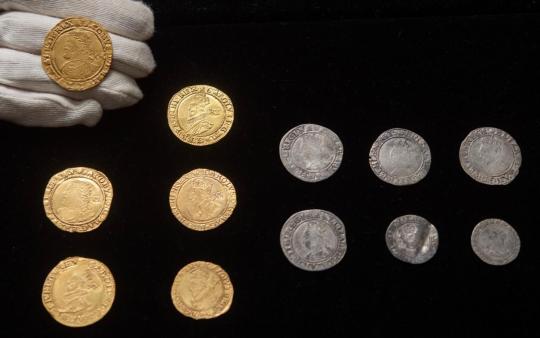
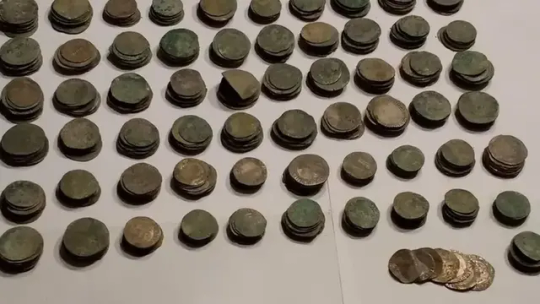
"Perhaps the most important short-term significance of the Civil Wars was that it culminated in the execution of King Charles I in 1649 and a republic was established for the first time in English history which lasted 11 years," Waseem Ahmed, a doctoral student of history at University College London who specializes in 17th century British political history but was not involved in the hoard's discovery or analysis.
It's no surprise that people hid their money back then, as warfare during this time included the seizure of opponents' property, he said.
"If you were a royalist or suspected royalist, you could have your estates sequestrated (seized) by the Parliamentary side and vice versa," Ahmed explained. This may be the case for the 17th-century homeowner, as Dorset was a hotspot for troop movements and the turbulence that followed.
It's likely that someone buried the Poorton Coin Hoard with the hopes of safeguarding it and retrieving it later. And while the treasure was certainly safeguarded, its retrieval took four centuries longer than its owner likely desired.
"If we hadn't lowered the floor, they would still be hidden there," Betty Fooks told The Guardian. "I presume the person intended to retrieve them but never got the chance."
By Hannah Kate Simon.
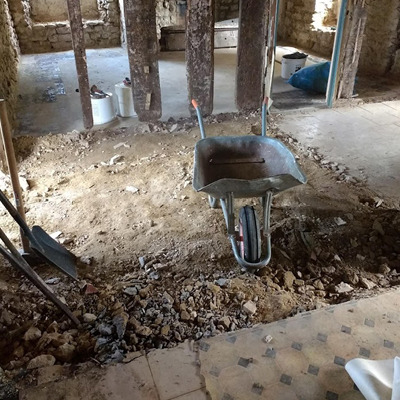
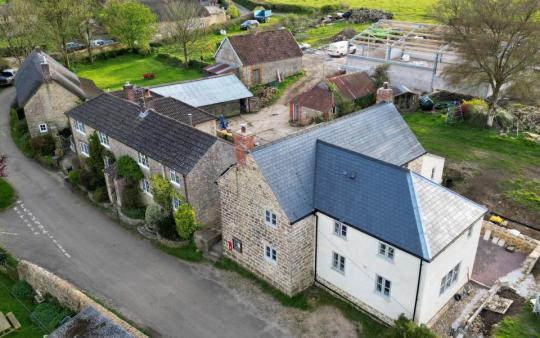
#Hoard of 17th-Century Coins Hidden During English Civil War Found#Dorset England#gold#silver#coins#collectable coins#ancient artifacts#archeology#archeolgst#history#history news#Poorton Coin Hoard#English Civil War
49 notes
·
View notes
Text
Nova’s Notes - North and South Weekly - Chapter 7
In which the Hale family finds a new home…
“In such towns in the south of England, Margaret had seen the shopmen, when not employed in their business, lounging a little at their doors, enjoying the fresh air, and the look up and down the street. Here, if they had any leisure from customers, they made themselves business in the shop—even, Margaret fancied, to the unnecessary unrolling and re-rolling of ribbons. All these differences struck upon her mind, as she and her mother went out next morning to look for lodgings.”
Already, Margaret is noticing a stark difference between her beloved Helstone and this new town. Here, they keep themselves as busy as possible, with no time for leisure or enjoyment. Here, the colors are less vibrant and everything has a purpose: no frills. Margaret may be of a practical mind, but I can tell she won’t like this change.
“Their two nights at hotels had cost more than Mr. Hale had anticipated, and they were glad to take the first clean, cheerful rooms they met with that were at liberty to receive them. There, for the first time for many days, did Margaret feel at rest. There was a dreaminess in the rest, too, which made it still more perfect and luxurious to repose in.”
Yikes, Mr. Hale didn’t plan ahead on the hotel costs, hm? Not off to a great start, but I am glad they have rooms and Margaret is able to rest at last. For the first time in weeks, she’s able to let herself breathe and not be stressed by her parents’ problems. Good for her!!!
“One evening it was arranged that Margaret and her father should go the next day to Milton-Northern, and look out for a house. Mr. Hale had received several letters from Mr. Bell, and one or two from Mr. Thornton, and he was anxious to ascertain at once a good many particulars respecting his position and chances of success there, which he could only do by an interview with the latter gentleman. Margaret knew that they ought to be removing; but she had a repugnance to the idea of a manufacturing town, and believed that her mother was receiving benefit from Heston air, so she would willingly have deferred the expedition to Milton.”
Unfortunately, it can’t last :( I’m not sure I agree with Margaret’s “repugnance” to Milton, but I understand this is part of her arc and I’m eager to see how she’ll react once she learns more about the people of the town. ALSO, Mr. Thornton mention!!! 👀 I may not have read the book before, but I happen to know he’s an important character, hehe…
“Quick they were whirled over long, straight, hopeless streets of regularly-built houses, all small and of brick. Here and there a great oblong many-windowed factory stood up, like a hen among her chickens, puffing out black “unparliamentary” smoke, and sufficiently accounting for the cloud which Margaret had taken to foretell rain…
“…People thronged the footpaths, most of them well-dressed as regarded the material, but with a slovenly looseness which struck Margaret as different from the shabby, threadbare smartness of a similar class in London.”
The language Gaskell uses here is very negative and solemn, reflecting Margaret’s true feelings regarding Milton. Some of this may be an honest depiction of how Milton looks, but I know more of it is through Margaret’s biased and negative perspective of the town. “Slovenly” (or, “dirty”) is a lot worse to be than “shabby” (or, “in poor condition through lack of care”).
Margaret and her father take a look at the available houses in their price range and much like the drama of HGTV, they don’t know which one to pick. Every one seems wrong for some reason. However, Margaret once again activates her “problem-solving” mode and comes up with a way for them to make house #2 work, though it’ll come at the cost of ugly wallpaper and Mr. Hale having his own study (if you think I feel bad for him here, you would be wrong). Again, I absolutely love seeing her in this mode!!! She’s so in her element and it’s great to see her so at ease after the stress of these past weeks. This line in particular is my favorite, though:
“‘Oh, wait a minute. I am overpowered by the discovery of my own genius for management.’”
YES GIRL 👏👏👏👏👏 SELF-CONFIDENT QUEEN (she could just mean “penchant”, as opposed to “brilliance” but still — I’m glad she knows she’s good at this). The wallpaper is not something they want to compromise on, and they hope to have Mr. Hale charm the landlord into letting them re-papering it. Not the guy *I* would have charm people (that’s not on my list of attributes I’ve seen from him), but hey he was a pastor. He should be good with people…so I guess this makes sense.
So, Mr. Hale leaves and Margaret is hoping to get a bit of rest…but there’s no time for a petty thing as rest!!! Mr. Thornton has called for them!!! Well…her father. But still 👀
“Margaret opened the door and went in with the straight, fearless, dignified presence habitual to her. She felt no awkwardness; she had too much the habits of society for that. Here was a person come on business to her father; and, as he was one who had shown himself obliging, she was disposed to treat him with a full measure of civility.”
If there was ever a list of benefits from staying at her aunt’s house, this would likely make the top of the list. Her bearing and manner meeting a strange man radiate confidence and owning the room. You would never know the stress she’s been through in the past few weeks because she won’t let you see it. She will be polite and business-like, but Gaskell uses such…I want to say, almost sharp language here — she almost feels intimidating in this moment.
And I’m not the only one who thinks so. We get a new perspective, from the viewpoint of Mr. Thornton. Let’s hear how he feels about Margaret’s entrance, shall we?
“Mr. Thornton was a good deal more surprised and discomfited than she. Instead of a quiet, middle-aged clergyman, a young lady came forward with frank dignity,—a young lady of a different type to most of those he was in the habit of seeing…
“…He did not understand who she was, as he caught the simple, straight, unabashed look, which showed that his being there was of no concern to the beautiful countenance, and called up no flush of surprise to the pale ivory of the complexion.”
He sounds like she jumpscared him or something 😂😂 and I guess she kind of did. But yes, he does seem to find her more than a little intimidating, with how he perceives her looks (from her beautiful face, I might add) as indifferent to his presence instead of the civility she’s going for.
Oh no, she’s being misunderstood again! And predictably, I’m dusting off my neurodivergent lens to analyze this. So, a lot of times ND individuals have difficulty making the proper facial expression to reflect the emotion they’re feeling (or expected to feel, depending on if they’re masking). This can lead to others perceiving their emotions as different from what they are (not to mention many NDs have difficulty understanding facial expressions in the first place, so they don’t even know what face they’re supposed to make in a given social situation).
Speaking of masking, I would say Margaret is masking — heavily. It’s touched on later in the chapter, but she is very tired at this moment. She was expecting to rest, and she is not given the chance because of this interruption. Now, she is forced to be civil to this random guy. This might be another reason for his misinterpretation of her emotions — her “civil” mask might be cracking to reveal her “tired” or “frustrated” face. He’s still not entirely correct in what he thinks she’s feeling towards him…but it’s a bit closer. Good for him, I guess?
And because I don’t like to leave stones unturned, we could also switch this lens to Mr. Thornton and wonder if perhaps part of the reason he’s misinterpreting her emotions is because he himself is neurodivergent and has difficulty reading facial expressions…(does that mean I’d have to do the same for everyone who misreads Margaret? Maybe. I’m still keeping an eye on Thornton, though.)
“Mr. Thornton was in habits of authority himself, but she seemed to assume some kind of rule over him at once. He had been getting impatient at the loss of his time on a market-day, the moment before she appeared, yet now he calmly took a seat at her bidding.”
She’s just met him, yet already has the ability to calm him, hmmmm??? I love this 👀👀👀👀👀
“Mr. Thornton had thought that the house in Crampton was really just the thing; but now that he saw Margaret, with her superb ways of moving and looking, he began to feel ashamed of having imagined that it would do very well for the Hales, in spite of a certain vulgarity in it which had struck him at the time of his looking it over.”
LOL, him looking at the house before: “yeah, I mean it’s good. Not the best house I’d pick, wallpaper is ugly, but the Hales will like it I’m sure.”
Him, know Margaret - A QUEEN - is going to live there: “*screaming internally* that’s a horrible house for her how could I have thought otherwise 😭😭😭😳😳😳 she deserves better” <- Margaret does deserve the best, he is right about that.
Anyway, I already love this dynamic. He’s spoken one sentence to her and he’s already smitten what the heck this is so cute 😭😭
“Margaret could not help her looks; but the short curled upper lip, the round, massive up-turned chin, the manner of carrying her head, her movements, full of a soft feminine defiance, always gave strangers the impression of haughtiness.”
Ahhhh this actually makes a lot of sense! Poor Margaret being judged like that just because she has a “look” of haughtiness.
“She was tired now, and would much rather have remained silent, and taken the rest her father had planned for her; but, of course, she owed to herself to be a gentlewoman, and to speak courteously from time to time to this stranger; not over-brushed, nor over-polished, it must be confessed, after his rough encounter with Milton streets and crowds. She wished that he would go, as he had once spoken of doing, instead of sitting there, answering with curt sentences all the remarks she made.”
All my “this is cute” being said, it is funny that he’s met her when she’s in a tired state and actively wants him to leave (and he kind of knows it?). This makes any conversation more awkward, but hey, they can work from this. I’ll take “not over-polished” over Lennox’s gilded comments (which have nothing substantial underneath) any day!
“She sat facing him and facing the light; her full beauty met his eye; her round white flexile throat rising out of the full, yet lithe figure; her lips moving so slightly as she spoke, not breaking the cold serene look of her face with any variation from the one lovely haughty curve; her eyes, with their soft gloom, meeting his with quiet maiden freedom.”
It’s cool seeing this from Mr. Thornton’s eye and how he perceives her. This whole time, we’ve been told she’s not pretty or considered beautiful among society, but to him, she’s a gem. Even when we saw Henry’s POV, he didn’t mention anything of her beauty, just how she blushed in his attempts to woo her. I know beauty isn’t everything, but I happen to like that he sees her beauty. It doesn’t feel overstated, either. He’s not describing her as “the most beautiful woman ever” or anything. He just notices she does have beauty. And I do notice the use of “quiet maiden freedom”, which — to me — parallels with her earlier use of “high maidenly dignity”, used back in chapter 3. Both times were used when about to talk to men they didn’t relish talking to…I don’t think that’s a coincidence. It’s cool that Thornton can actually see this within her.
“He almost said to himself that he did not like her, before their conversation ended; he tried so to compensate himself for the mortified feeling, that while he looked upon her with an admiration he could not repress, she looked at him with proud indifference, taking him, he thought, for what, in his irritation, he told himself he was—a great rough fellow, with not a grace or a refinement about him. Her quiet coldness of demeanour he interpreted into contemptuousness, and resented it in his heart to the pitch of almost inclining him to get up and go away, and have nothing more to do with these Hales, and their superciliousness.”
Thornton, NOOOOO, she’s just tired bro 😭😭😭 at least he kind of understands he’s trying to struggle with his feelings of admiration (and maybe feelings of more?) within himself, contrasted with her “indifference” towards him (which could be considered true, she really does want him to leave and that could be considered indifferent — or worse — towards him. In that case, he’s the first to guess fairly close to what she’s actually feeling). I can understand him, though. No one wants to talk with someone who’s looking down on them, especially someone who they actually want to connect with. And I hate him dismissing himself as rough and unrefined :(((( someone get this man’s confidence up please???
“Just as Margaret had exhausted her last subject of conversation—and yet conversation that could hardly be called which consisted of so few and such short speeches—her father came in, and with his pleasant gentlemanly courteousness of apology, reinstated his name and family in Mr. Thornton’s good opinion.”
Ok, add “good at talking to people” on Mr. Hale’s bingo card. I’ll give him this, he somehow turned this disastrous meeting into…well, Thornton not running away from Margaret. You get exactly 1 point from me, Mr. Hale: don’t screw it up.
Unfortunately, Mr. Hale was not able to persuade the landlord in removing his tacky wallpaper (people like him are why Charlotte Perkins Gilman wrote The Yellow Wallpaper /j) and they have to let it stay. Margaret immediately starts thinking of ways to hide it (ever the planner!), while Mr. Hale tries to invite Mr. Thornton to luncheon with them.
“It would have been very inconvenient to him to do so, yet he felt that he should have yielded, if Margaret by word or look had seconded her father’s invitation; he was glad she did not, and yet he was irritated at her for not doing so. She gave him a low, grave bow when he left, and he felt more awkward and self-conscious in every limb than he had ever done in his life before.”
Sorry, dude, Margaret is busy trying to figure out how to hide tacky wallpaper 😭😭😭 I love so much that Mr. Thornton like “it would be so inconvenient for me to eat lunch with them (and also Margaret’s been haughty/indifferent to me this whole time), but also how dare she not invite me to lunch too. 😒😠” yeah, you’re already down bad, Thornton. You’re just in denial :D and awww he’s self-conscious 😭😭
“Well, Margaret, now to luncheon as fast as we can. Have you ordered it?”
“No, papa; that man was here when I came home, and I have never had an opportunity.”
I’m glad Margaret defended herself here because…yeah, when would she have had the time??? Mr. Hale, I am TRYING to be nice to you…kindly do better so you make my job easier, PLEASE. In his defense, he didn’t press the issue or blame her after she said that.
When they detail the day’s events to Mrs. Hale, they ask her what Mr. Thornton is like. At first she’s like “I hardly know what he’s like 🙄” but then she says this:
“‘About thirty—with a face that is neither exactly plain, nor yet handsome, nothing remarkable—not quite a gentleman; but that was hardly to be expected.’”
“‘With such an expression of resolution and power, no face, however plain in feature, could be either vulgar or common. I should not like to have to bargain with him; he looks very inflexible. Altogether a man who seems made for his niche, mamma; sagacious, and strong, as becomes a great tradesman.’”
…it looks like our Margaret took a little more notice of Thornton than she let on, hm? 👀👀 I actually love that Gaskell shows us and doesn’t tell us Margaret’s notice of him; it’s far more interesting to think she was just tired the whole time and uninterested with a sudden twist of “actually he’s strong and powerful-looking etc. etc.” rather than Gaskell telling us both of them were taken with the other from the first moment. Plus it made me do this -> 🤭 IRL so that’s always fun.
“But when they removed to their new house in Milton, the obnoxious papers were gone. The landlord received their thanks very composedly; and let them think, if they liked, that he had relented from his expressed determination not to repaper. There was no particular need to tell them, that what he did not care to do for a Reverend Mr. Hale, unknown in Milton, he was only too glad to do at the one short sharp remonstrance of Mr. Thornton, the wealthy manufacturer.”
EEEEEEEEEEEE 😍😍😍😍😍🤭🤭🤭🤭🤭 this line right here is AMAZING and ICONIC. Get you a man who will get ugly wallpaper removed from your rented house. Thornton!!!!! I knew you liked her!!!! Hehehehehhee. This is what rom-coms were inspired by, I’m convinced.
#sorry this is super late#again 😫#I’ll try to get the next one out soon#north and south#also if I sound more silly in this one#mr thornton brings that out of me I guess 👀��#north and south weekly#margaret hale#john thornton#novas notes
10 notes
·
View notes
Text
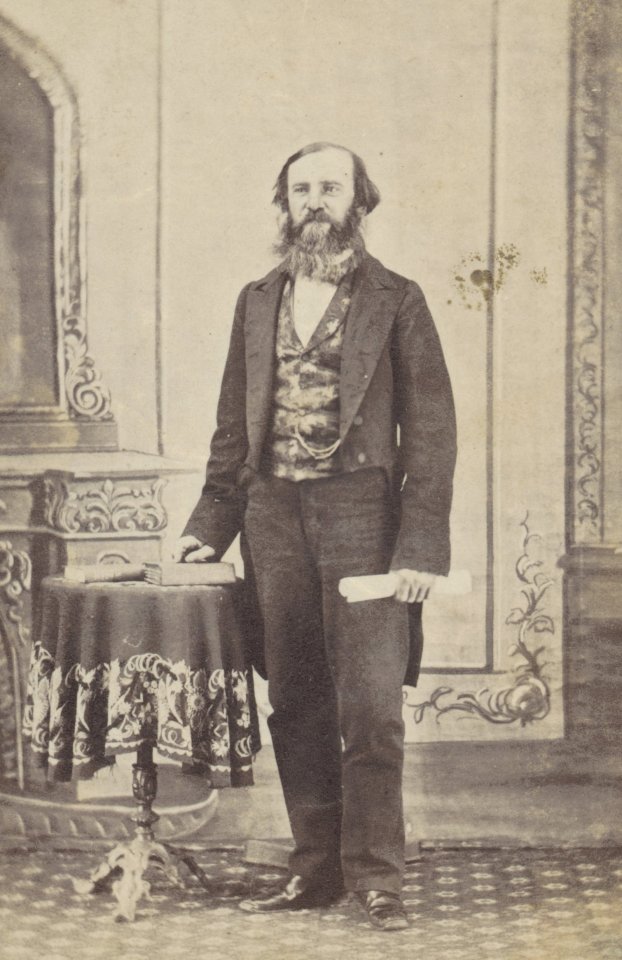
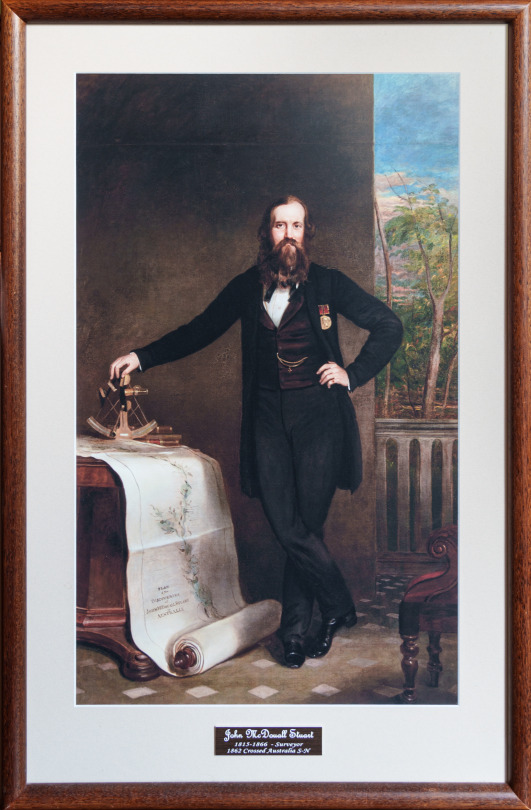
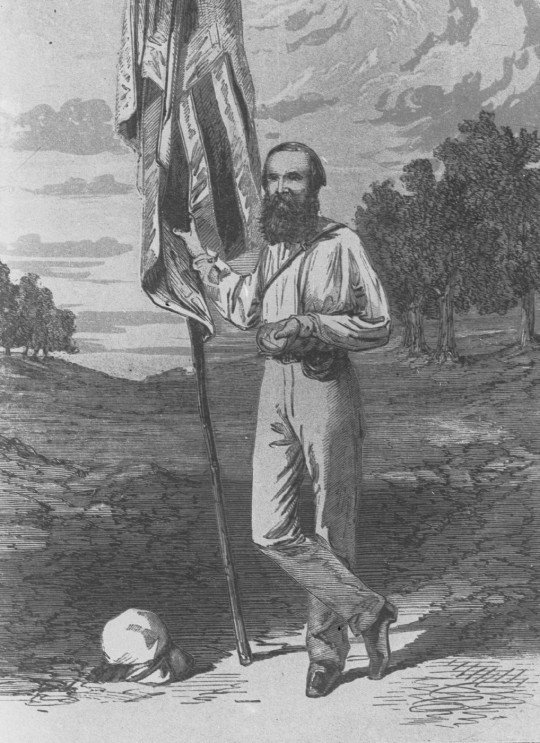

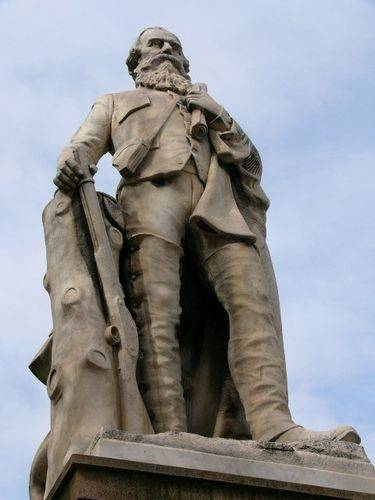
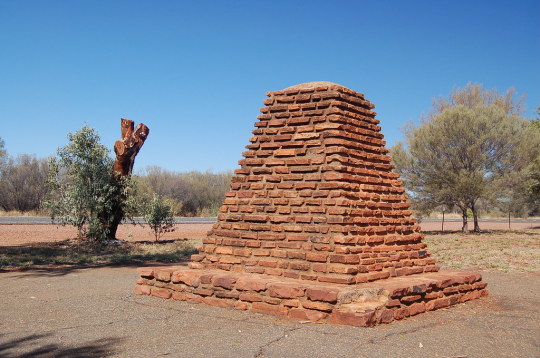
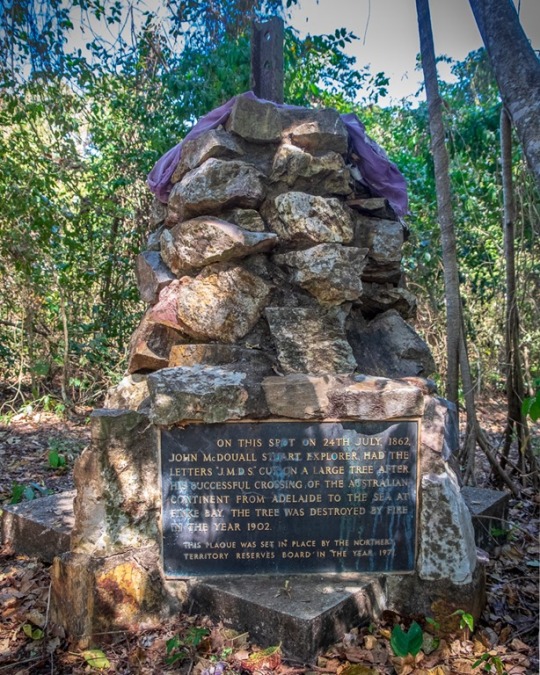
On September 7th 1815, explorer John McDouall Stuart was born in Dysart, Fife.
Descended from a family steeped in military service, Stuart was born in in a sixteenth-century home which now houses a museum in his honour, as seen in the pic. He was the son of army captain William Stuart and his wife Mary (née McDouall). Orphaned in his early teens, he attended the Scottish Naval and Military Academy, Edinburgh, and graduated as a civil engineer.
At the age of 23 he embarked on the Indus from Dundee, arriving at Holdfast Bay, South Australia, in January 1839. He entered the Government Survey Department and, despite primitive conditions in survey camps, found that nomadic life in the bush appealed to him. A man of small stature, his life became a constant battle against ill health and poverty. Assigned as draughtsman for the 1844-46 expedition of Captain Charles Sturt into the interior, Stuart gained valuable experience and received his leader’s full approbation. Sturt’s failure to reach the centre of the continent inspired Stuart’s later achievements.
Returning to Adelaide in January 1846, Stuart was incapacitated with scurvy for twelve months and moved to Port Lincoln for health reasons, while recovering he worked for fellow Scot and shipmate James Sinclair on his properties and tutored the Sinclair children.
In 1854 William Finke and the Chambers brothers, James and John, engaged him to survey leases and prospect for minerals in the northern Flinders Ranges. Between May 1858 and January 1860 Stuart led three expeditions into the Lake Eyre region, seeking new grazing lands and minerals for his sponsors.
In contrast to Sturt, Stuart travelled quickly with limited supplies. Horses were his only means of conveyance. On his first attempt to cross the continent, he reached the geographical centre of Australia on 22nd April 1860, accompanied by two companions and twelve horses --- a feat later described as ‘the greatest and pluckiest exploration ever accomplished’. He tried again the following year but it was not until 1862 that he finally made it to the northern shore.
In poor health Stuart returned to England in 1864, nearly blind and with a broken constitution. He died on 5th June 1866, a forgotten hero. He was buried at Kensal Green Cemetery, London, with a memorial stone erected by his sister Mary.
As a result of Stuart’s expeditions, the nature of the Red Centre was revealed, South Australia gained control of and settled the Northern Territory, and vast areas of the interior were opened up for European settlement. In 1872 the Adelaide-to-Darwin Overland Telegraph Line was completed along Stuart’s route.
His statue was erected in Victoria Square, Adelaide in 1904 and Central Mount Stuart, the Stuart Highway and Stuart Range are named in his honour. The John McDouall Stuart Society was founded in 1964 by descendants of his companions to perpetuate his name and achievements.
A second statue of Stuart can be found in Alice Spring. The statue has been hounded by controversy since it was gifted to the Alice Springs Town Council in 2010, with some saying the work is culturally insensitive. Protests accuse him of not asking permission to enter the land and of killing Arrernte people."You came to Mount Hay and you killed our mob," a letter from Aboriginal elders said. "You went to Attack Creek and you killed more of our mob. This is murder and we can't forget it." it continued.
The Australian Aboriginal singer Warren H Williams also spoke at a protest rally, mocking the size of the gun and calling for the statue to be removed.
"This fella has destroyed both Arrernte and Warramungu [people]...look at the statue, it's a big gun," he said.
"They put a statue up of him, but never asked anybody, even the white people in this town if they can put it up..."
There are numerous memorials to Stuart around South Australia.
8 notes
·
View notes
Text
Get A Quick And Accurate Quote For Your House Move with South London Removals
#House Removals London#home Removals South London#home moves South London#house pack & move services#London moving services#London removals
0 notes
Text
In honor of Black History Month, here are 10 Black Americans who were pioneers of their time. (I apologize that this post is late. I’ve been preoccupied with midterm exams)
Eugene Bullard (1895 - 1961)
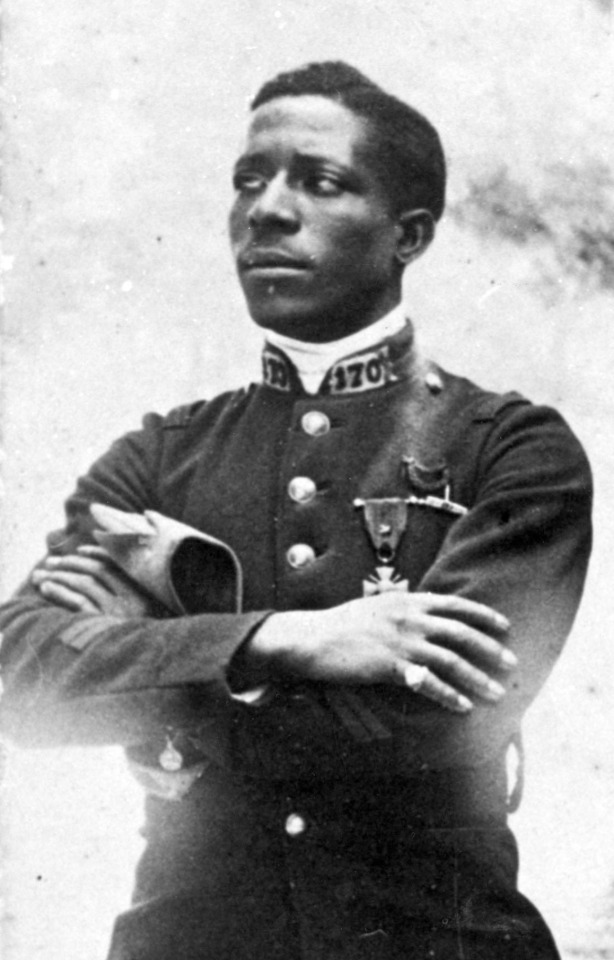
Eugene Bullard was one of the first African American military pilots in the world. Originally from Georgia, Bullard had run away from home when he was 11 and wondered around the state for six years with a clan of gypsies before stowing away on a German cargo ship in 1912. He ended up in Aberdeen, Scotland and eventually ended up in London, where he worked as a boxer and performer for an entertainment troupe. He traveled to Paris for a boxing match and eventually settled there permanently. When World War 1 began in 1914, Bullard joined the French Foreign Legion, where he saw combat at the Somme, Champaign, and Verdun. After being injured during the Battle of Verdun, he was sent to Lyon to recuperate. After recovering in 1916 he joined the French Air Service as a machine gunner. He obtained his pilot's license in 1917. He flew several missions during the war and claimed two victories over German planes. He applied to join the American Air Corps after the United States entered the war in 1917 but was rejected because of his race. Bullard returned to the French Air Service but was removed after an apparent conflict with a French officer. He remained in the military until 1919. He returned to Paris where he worked a nightclub, operated his own nightclub and gym, and married Marcelle de Straumann. After Germany invaded France in 1940, he volunteered to fight again, but was injured during the defense of Orleans. He escaped to Spain and later returned to the United States, settling in Harlem, New York City. In 1949, he was working as a security guard at concert hosted by Paul Robeson. Riots broke out where a racist mob and police officers beat concert goers, including Bullard. He eventually died of Stomach Cancer in 1961.
Bullard received many honors from France. In 1954, the French government invited Bullard to Paris to be one of the three men chosen to rekindle the everlasting flame at the Tomb of the Unkown Soldier under the Arc de Triomphe. In 1959, he was made a Knight of the National Order of the Legion of Honor. He also received the Military Medal, an award given for courageous acts and the third highest award in France. After his death, he also received honors from the United States. He was posthumously commissioned as a Second Lieutenant in the United States Air Force in 1994. He was inducted into the Georgia Aviation Hall of Fame in 1989 and the National Aviation Hall of Fame in 2022. The Museum of Aviation in Warner Robbins, Georgia erected a statute in honor of Bullard.
Ruby Bridges (1954 - )

Ruby Bridges hadn't even been born yet when, in 1954, the United States Supreme Court made a landmark ruling in the Board vs. Board of Education case that declared that desegregation in public schools was unconstitutional. This decision caused protests and celebrations all across the South, including New Orleans, Louisiana. In 1960, when Ruby was 6 years old, U.S. Circuit Court Judge ruled that schools in New Orleans must begin desegregation. Ruby was one of four 6-year-old girls (the others being Lenona Tate, Tessie Provost, and Gail Etienne) selected by the NAACP to participate in the integration. Tate, Provost, and Etienne enrolled at McDonogh 19 Elementary School, while Bridges enrolled at William Frantz Elementary School. All four faced death threats, racial slurs, and taunts. After a race riot broke out at Parish School Board meeting, U.S. Marshalls were called in to escort the girls to and from school.
Since the tumultuous period, Bridges has become a symbol of the Civil Rights Movement. She has been the subject of Songs, documentaries, movies, and 1964 Norman Rockwell painting "The Problem We All Live With". She is currently the Chair of the Ruby Bridges Foundation. She has also received numerous accolades over her life including the Presidential Citizens Medal by President Clinton in 2001, being honored as a "Hero Against Racism" by the Anti-Defamation League in 2006 and being inducted in the National Women's Hall of Fame in 2024.
Bessie Coleman (1892 - 1926)
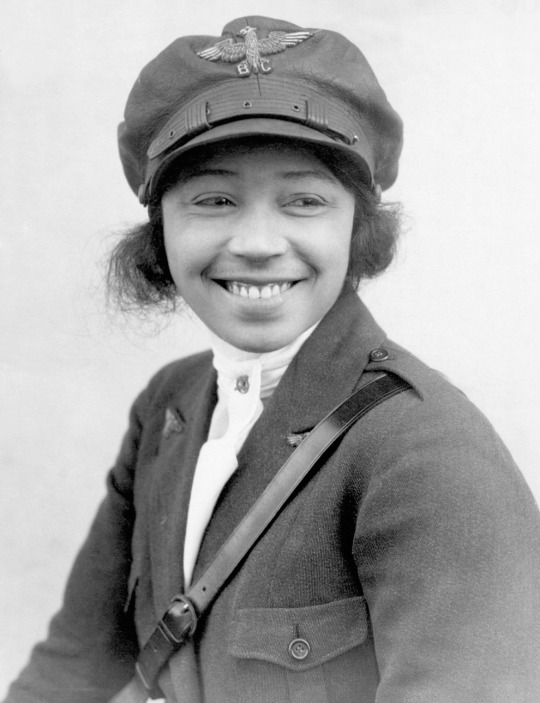
Bessie Coleman was born the tenth child out of thirteen to a family of sharecroppers in Texas. She walked four miles each day to attend a segregated school where she loved reading and established herself as an exceptional math student. Every harvest season she helped her family harvest cotton. When was turned eighteen years old, she enrolled at the Oklahoma Colored Agricultural and Normal University in Langston, Oklahoma (known today as Langston University). She only completed one term before running out of funds and returning home. In 1915, she moved to Chicago to live with brothers where she worked as a manicurist at a barbershop, where she heard flying stories of pilots returning from their service in World War 1. She took a second job as a restaurant manager to save money in the hopes of becoming a pilot herself, but flight schools in the U.S. at the time were not accepting women nor black people. As such, she was encouraged to study abroad by Robert Abbott, publisher of the African American newspaper 'The Chicago Defender'. To do this she received financial backing from the defender and banker Jesse Binga (founder of the first black owned bank in Chicago).
In 1920, she traveled to France to earn her license. She trained on a Nieuport 14 Biplane. In 1921, she received her pilots license, becoming the first black woman (and first black person in general) to receive a license from the Fédération Aéronautique Internationale. She returned to the United States in September becoming a media sensation. She made a living performing in air shows as a stunt flier. She met with community activists and spoke before crowds about perusing aviation as a profession and the goals of black people in the United States. Unfortunately, she was killed in 1926, when the plane she was flying in lost control and threw her out at 2,000ft. Though she never established her own flight school, her ambitions inspired many other black aviators to this very day.
Katherine Johnson (1918 - 2020)
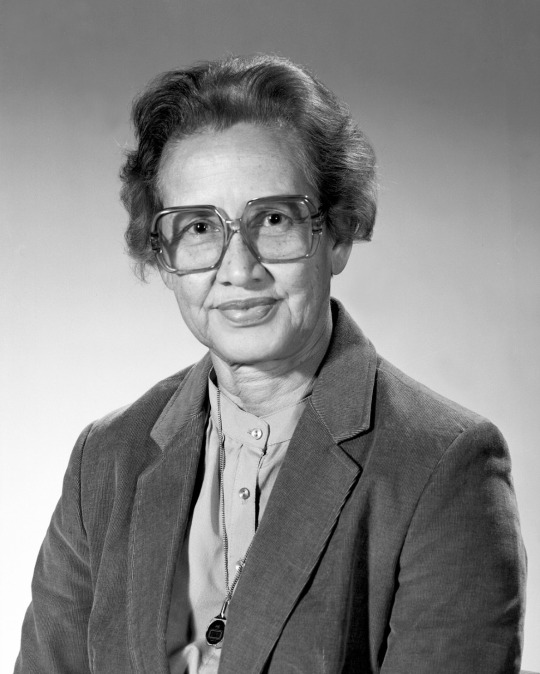
Katherine Johnson was one of the first black to be employed as a scientist at the National Aeronautics and Space Administration. Born in White Sulpher Springs, West Virginia, she was the youngest of four children. Her mother was a teacher, and her father was a lumberjack, farmer, and handyman. From an early age she displayed strong mathematical abilities, so her parents enrolled her in high school in Institute since their home county didn't school for African Americans passed the 8th grade. After graduating high school, she enrolled at West Virginia State College, where took every mathematics course offered (new classes were even added just for her). She graduated 'summa cum laude' in 1937 and took a teaching job Marion, Virginia.
In 1938, the Supreme Court ruled that states that provide higher education for white students must provide it for black students as well. As a result of this, Johnson was selected along with two men to become the first black students to be enrolled at the West Virginia University Graduate School in 1939. However, she left the program to start a family with her husband James Goble. The couple had three daughters: Joylette, Katherine, and Constance.
At a family gathering in 1952, a relative informed her that the National Advisory Committee for Aeronautics (NACA, the precursor to NASA) was hiring mathematicians and that the Langley Research Center was hiring Black applicants as well as white. Johnson took a job at the agency in 1953. She spent 33 years with NACA and NASA, where she earned a reputation as a human computer for mastering complex mathematical calculations and helping pioneer the use of electronic computers. She worked at topics including gust alleviation, flight trajectories, and launch windows. Her work was instrumental to the Apollo Missions during the Cold War 'Space Race'. For her work she was awarded the Presidential Medal of Freedom in 2015, the Silver Snoopy Award and a NASA Group Achievement Award in 2016, and the Congressional Gold Medal in 2019. She was the one of the subjects of the 2016 film Hidden Figures, and she was posthumously inducted into the National Womens Hall of Fame in 2021.
Shirley Chisholm (1924 - 2005)

Shirley Chisholm was the first black woman to be elected to the United States Congress. She was born in Brooklyn to working class parents. Since her mother face difficulty working and raising her children, Shirley and her three younger sisters were to live with their grandmother in Barbados. She said about her grandmother "Granny gave me strength, dignity, and love. I learned from an early age that I was somebody. I didn't need the black revolution to teach me that". She returned to the United States in 1934 and in 1939, began attending the integrated Girl's High School in Brooklyn. She did so well academically, she served as the Vice President of the Junior Arista Honor Society. She attended Brooklyn College where she majored in sociology and graduated in 1946. She married her husband Conrad in 1949. After suffering two miscarriages, the couple learned they could not have children. She worked as a teacher's aide from 1946 to 1953, during which she went on to obtain her master's degree in childhood education from Columbia University in 1951. She soon became an authority on childhood education and child welfare as a consultant for the Division of Day Care in New York City's Bureau of Child Welfare.
She entered politics when she joined the effort to elect Lewis Flagg Jr. to the bench as the first black judge in Brooklyn. The election group became known as the Bedford–Stuyvesant Political League (BSPL), which pushed candidates that supported civil rights and advocated for expanding opportunities in Brooklyn. After leaving the BSPL she worked with a number of different political groups including the League of Women Voters, the National Association for the Advancement of Colored People (NAACP), the Urban League, and the Democratic Party Club in Bedford-Stuyvesant, Brooklyn.
In 1964, Chisholm decided to run for the New York State Assembly after the present holder, Thomas R. Jones, was appointed to the New York City Civil Court. Despite resistance because she was a woman, she appealed to women voters and won the Democratic primary in June. She was elected in December serving in the assembly from 1965 to 1968, where she championed several pieces of legislation including expanding unemployment benefits and sponsoring the introduction of the SEEK program which helped disadvantaged kids enter college. In 1968 Chisholm ran for the United States House of Representatives for New Yorks 12th District, which had recently been redrawn to incorporate the Bedford-Stuyvesant neighborhood. She ran with the slogan "unbought and unbossed" and won the district with a nearly 2 to 1 margin over her opponent, becoming the first black woman ever elected to Congress. She served on a number of different committees during her career, including the Agriculture, Veterans, and Education and Labor Committees. She worked with Bob Dole to expand the Food Stamps program, played a critical role in the creation of the WIC program, and was a founding member of the Congressional Black Caucus and the National Women's Political Caucus. In 1972, she became the first black candidate for a major-party nomination for President of the United States and the first woman to run for the Democratic Party's presidential nomination, though she ultimately lost the nomination. She retired from politics in 1983, after 14 in Congress. She was posthumously awarded the Presidential Medal of Freedom in 2015.
Thurgood Marshall (1908 - 1993)

Thurgood Marshall was a lawyer and jurist who served as the black justice of the United States Supreme Court. Marshall was originally from Baltimore, Maryland, where graduated from high school with honors in 1925 and then attended Lincoln University in Pennsylvania where he graduated with honors in 1930 with a bachelor's degree in American literature and philosophy. While at Lincoln, he led the schools debate team to numerous victories. He attended Howard University Law School in Washington, D.C. because he couldn't attend the all-white University of Maryland Law School. While at Howard, he was mentored by NAACP first special counsel and Law School Dean George Hamilton Houston. He graduated first in class in 1933. He joined Houston as his assistant at the NAACP in 1935, where they worked together on the landmark case Missouri ex rel. Gaines vs. Canada, which ruled that any state which provides a school to white students had to provide in-state education to black students as well. After Houston returned to Washington, Marshall took over his position as special counsel to the NAACP and also became director-counsel of the NAACP Legal Defense and Educational Fund Inc.
During his career he argued 32 civil rights before the Supreme Court, winning 29 of them. Many of them were landmark cases including Smith vs. Allwright (which ruled that primary elections must be open to voters of all races), Morgan vs. Virginia (which ruled that a state law enforcing the segregation of interstate buses was unconstitutional), Shelley vs. Kramer (which ruled that racially restrictive housing covenants cannot be legally enforced), and Brown vs. Board of Education (which ruled that state laws requiring segregation in schools was unconstitutional).
In 1961, President John F. Kennedy appointed him as a judge on the United States Court of Appeals for the Second Circuit in order for Kennedy to demonstrate his commitment to the interests of black Americans. He took the oath after numerous delays by southern Senators. Marshall authored 98 majority opinions while on the bench. He was nominated as the United States Solicitor General by President Lyndon B. Johnson in 1965, where he won fourteen of the nineteen Supreme Court cases he argued. In 1967, Johnson nominated Marshall to be a Supreme Court Justice after Justice Tom C. Cark resigned. He took the Oath of Office on October 2. Marshall remained on the Court for 24 years until his retirement in 1991. A staunch liberal, he often dissented from the court as the liberal majority vanished and the court became more conservative. During his tenure he advocated for equal rights for minorities, opposed the death penalty, and supported abortion rights.
Jesse Owens (1913 - 1980)

Jesse Owens was an American track and field athlete who won four gold medals at the 1936 Summer Olympic Games. Owens was born the youngest of ten children in Oakville, Alabama. In 1922, his family moved to Ohio during the great migration in search of better opportunities. As a child, he developed a passion for running, which was encouraged by his middle school track coach Charles Riley. It was in middle school where he met Minnie Solomon. They married in 1935 and had three daughters: Gloria in 1932, Marlene in 1937, and Beverly in 1940. He first came to national attention while attending high school where he equaled the world record of 9.4 seconds in the 100 yards dash and long-jumped 24 feet 91⁄2 inches at the 1933 National High School Championship in Chicago. While a student at Ohio State University, Owens won a record eight NCAA championships. Notably in 1935, he set three world records and tied a fourth during the Big Ten Conference track meet in Ann Arbor. He equaled the world record of 9.4 seconds in the 100-yard dash and set records for the long jump at 26 feet 81⁄4 inches, the 220-yard sprint at 20.3 seconds, and the 220-yard low hurdles at 22.6 seconds, which cemented him in track and field history.
In 1936, in despite of his apprehension, he was selected to compete in the Summer Olympics in Berlin, Germany. At the time, Germany was under the iron grip of the Nazi regime led by Adolf Hitler. Hitler saw the games as an opportunity to promote the Nazi ideals of antisemitism and Aryan supremacy. He believed German athletes would dominate the games. However, he visions went unfulfilled. Over the length of competition Owens won Gold Medals in the 100-meter dash at 10.3 seconds, the long jump at 26 ft 5 inches, the 200-meter sprint at 20.7 seconds, and the 4 x 100-meter sprint relay at 39.8 seconds. On August 1, Hitler shook hands with the German victors only and left the stadium and then skipped all further medal presentations. Despite his victories, racial discrimination in the United States made it difficult for Owens to earn a living, being prohibited from appearing at sporting events and refused commercial sponsorships. He attempted several careers, but all they proved fruitless. He hit rock bottom in 1966, when he was prosecuted for tax evasion. In 1955, President Dwight D. Eisenhower selected Owens as a Goodwill Ambassador, being sent all around the world to promote physical exercise and tout American freedom and economic opportunity in the developing world, a position held until the 1970s. He also did product endorsement for corporations such as Quaker Oats, Sears and Roebuck, and Johnson & Johnson. He was invited to the 1972 Munich Summer Olympics as a guest of the West German government. He eventually retired and moved to Arizona with his wife. Owens succumbed to Lung Cancer in 1980 at the age of 66 and was buried in Tucson, Arizona. In 1983 he was inducted into the U.S. Olympic Hall of Fame and was posthumously a Congressional Gold Medal in 1990.
Hiram Revels (1827 - 1901)
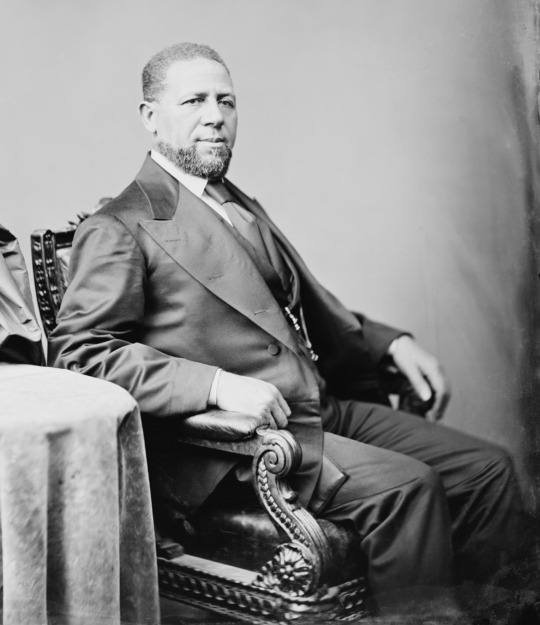
Hiram Revels was the first African-Amercian to serve in the United States Congress. He was born to free black people in Fayetteville, North Carolina. His father was a Baptist preacher. He attended a Quaker seminary in Indiana as a boy and in 1845, was ordained as a minister with the African Methodist Episcopal Church. He traveled throughout the Midwest preaching and acted as a religious teacher. He studied religion at Knox College in Illinois from 1855 to 1857 and then became a minister a Methodist Episcopal Church in Baltimore, Maryland, while also serving as a high school principal. During the Civil War, he enlisted as a Chaplain in the Union Army and helped recruit and organized two black regiments in Maryland and Missouri.
In 1866, Revels was called to be the pastor in Natchez, Mississippi where he settled permanently with his wife and five daughters. In 1868, during the Reconstruction Era, he was elected as an Alderman of Natchez and in 1869, he was elected to represent Adams County in the Mississippi State Legislature. In 1870, Revels was elected to the United States Senate by the state legislature to fill the seat left since before the Civil War. Southern Democrats opposed his seat, stating that the 1857 Dred Scott decision disqualified him on basis if citizenship. He officially became the first black senator on February 25. As a senator, he advocated compromise and moderation, and supported racial equality. He served on both the Committee of Education and Labor and the Committee of the District of Columbia (at the time, Congress administered the district). His professional conduct was greatly admired by fellow congressmen and the Northern press. After his term expired, he became President of Alcorn Agricultural and Mechanical College in Claiborne County, Mississippi (currently Alcorn State University). He served in this post until his retirement in 1882. In 2002, he was listed as one of 100 Greatest African Americans by Molefi Kete Asante.
Henry Johnson (1897 - 1929)
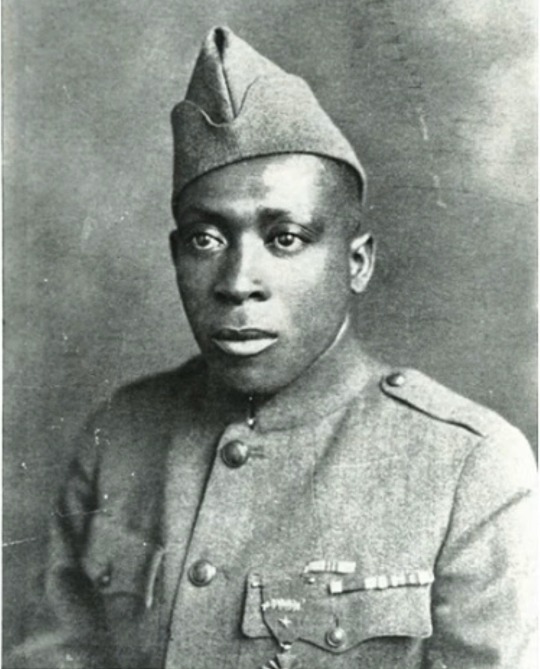
Henry Johnson was an American soldier who was noted for heroic actions during World War One. Originally from North Carolina, he moved to Albany, New York and worked variety of menial jobs before enlisting in the army in 1917, two months after the United States entry into the First World War. The unit he was assigned to, the all-black New York National Guard 15th Infantry Regiment, was mustered into federal service and redesignated as the 369th Infantry Regiment, commonly known as the Harlem Hellfighters. The regiment was assigned to labor service duties while stationed in Europe. The black service members faced discrimination and harassment by white soldiers and even the American headquarters. The American commander loaned the regiment to the French Army. It's believed he did this because white soldiers refused to fight alongside black soldiers. The French enthusiastically welcomed the new troops.
The regiment, Johnson included, was assigned to the Ardennes Forest. While on outpost duty on the night of May 14, 1918, Johnson came under attack by a German raiding party. Using only his bare hands, a bolo knife, his rifle butt, and some grenades, he was able to repel the attackers, killing four of them and preventing the capture of his fellow soldiers, all while suffering 21 wounds. He was given the nickname "Black Death" for his actions and awarded the Croix de guerre by France. However, his actions went unrecognized in the U.S. because of racial discrimination, and he died poor and in obscurity. However, he has since been posthumously given several awards by the military, including the Purple Heart in 1996, the Distinguished Service Cross in 2002, and the Medal of Honor in 2015. In 2023, the U.S. Army base Fort Polk in Louisiana was renamed Fort Johnson in his honor.
Dorothy Height (1912 - 2010)
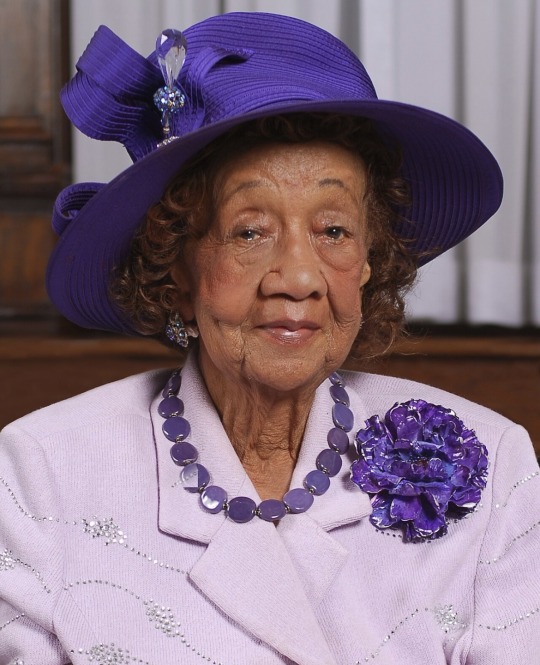
Dorothy Height was an activist for both the Civil Rights and Women's Rights movements. Height was born in Richmond, Virginia and moved to Rankin, Pennsylvania when she was five. Her mother was active in the Pennsylvania Federation of Colored Women's Clubs, and regularly took along Dororthy to meetings, which exposed her to activism from a young age. Height was an enthusiastic participate in Young Women's Christian Association, who was eventually elected as president of the club. She was appalled to learn that her race prevented her from using the YMWA's central branch swimming pool and dedicated much energy to changing the YWCA. While in high school she was active in the anti-lynching movement and won first place and a $1,000 scholarship in a national oratory contest held by the Elks Club. Height graduated from high school in 1929 and was accepted entry in Bernard College at Columbia University but was barred from entering because the school had an unwritten policy of only admitting two black students a year. She instead enrolled at New York University and graduated with a bachelor's degree in 1932 and a master's degree in educational psychology in 1933. She pursued postgraduate work at the New York School of Social Work.
From 1934 to 1937, Height worked for the New York Department of Welfare, a job she credited for teaching her conflict resolution skills. She then took a job as a counselor at the YWCA Harlem Branch. While working there she met civil rights activist Mary McLeod Bethune and First Lady Eleanor Roosevelt at a meeting of the National Council of Negro Women being held at the YWCA office. During this meeting Bethune told her "The freedom gates are half ajar. We must pry them fully open". She dedicated her life to this cause. She also did work with the United Christian Youth Movement, a group that worked to relate faith to real-world problems.
Beginning in 1939, she worked at YWCA offices in New York City and Washington, D.C., specializing in interracial relations. She ran trainings, wrote periodicals, and worked in Public Affairs on race issues. She believed that segregation caused prejudice through estrangement, so after the YWCA adopted in interracial charter in 1946, Height worked to help white members of the organization transcend their apprehension and bring their action in line with what the YWCA principles by running workshops, facilitating meetings, and writing articles. In 1958, she was elected president of the National Council of Negro Women and remained at the post until 1990. While president of the NCNW, she worked alongside civil rights leaders such as Martin Luther King Jr., John Lewis, and Whitney Young. Thanks to her background as an orator, she became a master at acting as the middleman in initiating dialogue between feuding parties. In 1963 she became head of the "Action Program for Integration and Desegregation of Community YWCAs", which was started in response to the growing civil rights movement. In this role she worked to monitor progress in integrating the association. In 1974, she was named to the National Commission for the Protection of Human Subjects of Biomedical and Behavioral Research, which was formed in response to the Tuskegee Syphilis Experiment scandal. She was also a driving force behind the movement to get a statue of Mary McLeod Bethune in Lincoln Park, the first statue of a woman or a black person to be erected on federal land.
She was inducted into the National Women's Hall of Fame in 1993. She was awarded the Presidential Citizen's Medal in 1989, the Presidential Medal of Freedom by President Bill Clinton in 1994, a Congressional Gold Medal by President George H.W. Bush in 2004, and President Barack Obama called Height "the godmother of the civil rights movement and a hero to so many Americans". She died on April 20, 2010, at the age of 98. She was buried at Fort Lincoln Cemetery in Maryland after a funeral at the National Cathedral in Washington D.C. She is considered one of the driving forces of the American Civil Rights Movement.
10 notes
·
View notes
Text
With so much of its attention consumed by the war in Ukraine, Russia has been unable to attend to much of its historic sphere of influence—particularly in the South Caucasus, where Moscow’s hold is fraying at the seams. On April 11, a new outbreak of violence in the 35-year-old, unresolved conflict between Armenia and Azerbaijan in Nagorno-Karabakh left four Armenian and three Azerbaijani soldiers dead as the two sides exchanged artillery and machine gun fire.
The province, recognized as the sovereign territory of Azerbaijan under international law, was occupied by the Armenian military for 26 years following the end of the First Nagorno-Karabakh War in 1994. Under the terms of the United Nations charter, Nagorno-Karabakh is Azerbaijani territory. But the province is also home to a large ethnic Armenian population that, as the Soviet Union was crumbling in 1988, unilaterally declared its independence from Azerbaijan.
After the first war in the province in the 1990s, which ended in Armenian victory and the expulsion of the Azeris, support from Yerevan allowed the separatists to enjoy a form of de-facto independence even though no country in the world, not even Armenia itself, officially recognized them. In 2020, Azerbaijan reclaimed most of the territory that Armenia had occupied for the preceding quarter-century. After 44 days of fighting, the Second Nagorno-Karabakh War ended in November 2020 with a cease-fire agreement brokered by the Russians.
The cease-fire was, on the surface, meant to make room for a formal peace agreement between the two neighbors. But many experts suspect that Russia, which is allied with Armenia, wanted to keep the conflict frozen—with a fragile cease-fire but no durable peace settlement. Any peace treaty was likely to favor Azerbaijan and weaken the Kremlin’s influence in the South Caucasus.
Last November, these suspicions were heightened following the appointment of the Armenia-born, Kremlin-linked oligarch Ruben Vardanyan as the unofficial “first minister” of the ethnic Armenian separatists in Nagorno-Karabakh. Under Vardanyan, peace talks stalled. However, his role as a spoiler came to a premature close in February, when he was unexpectedly sacked from his position by the separatists’ president, Arayik Harutyunyan.
The exact circumstances of his removal are unclear, but it was widely interpreted as a setback for Moscow. April’s clashes serve as further evidence that Russia is losing ability to maintain control over the region, where it has stationed 2,000 armed peacekeepers as per the terms of the cease-fire agreement. In an attempt to arrest this decline, the Kremlin appointed general Alexander Lentsov as the new head of its Nagorno-Karabakh peacekeeping force last week.
His appointment matters because Lentsov is one of Russia’s most experienced military figures, with his arrival a signal that Moscow is serious about reasserting its grip on the Caucasus. He has previously served as the head of the so-called joint center for cease-fire control, coordination, and stabilization in the Donbas following the first conflict in Ukraine in 2014, and has also been involved in Russia’s military operations in Chechnya, South Ossetia, and Syria in the past.
From a Western perspective, this is a worrying development: Each of those conflicts have ultimately ended on terms that favor Russia and run counter to Western values and interests. Lentsov’s arrival in Nagorno-Karabakh should therefore set off alarm bells in Washington, London, and Brussels.
It is widely accepted among regional experts that Russia seeks to act as a spoiler in the South Caucasus. A frozen conflict suits Moscow. It can lean on the unresolved grievances between Baku and Yerevan to heat up the standoff whenever such actions feel opportune. A peace agreement would also remove the need for Moscow’s peacekeepers in the province, which the Kremlin sees as essential to its projection of power over its near neighbors. Were the West to broker a settlement, it would also expand U.S. and European influence in a region that Moscow regards as its own backyard.
“Peace between Azerbaijan and Armenia will have many beneficial consequences for the United States and for Europe,” said Michael Doran, the director of the Center for Peace and Security in the Middle East at the Hudson Institute. “It will contribute to the energy security of Europe because it will open up the possibility of increasing oil and gas supplies from Azerbaijan and, potentially, from central Asia through Azerbaijan.” Doran adds that such an outcome would also “strengthen Georgia, which is in the interest of the United States. In general, peace carried out under the auspices of the United States is going to shift the balance against Russia in the South Caucasus.”
The timing of Lentsov’s appointment was telling: It came just four days before the foreign ministers of Armenia and Azerbaijan were due in Washington for meetings with U.S. Secretary of State Antony Blinken. The “tangible progress” made at the talks is due to be followed up this weekend with another meeting between Azerbaijani President Ilham Aliyev and Armenian Prime Minister Nikol Pashinyan in Brussels, rehabilitating the U.S.-EU twin track process that made some gains last year before stalling.
The Americans are evidently aware of the benefits of reconciliation. However, inconsistent signals from European mediators have in the past led to accusations of bias from Azerbaijan, leaving the door open for Russia to obstruct the process. But with Moscow consumed by its war in Ukraine, which is expected to intensify this spring when Kyiv launches a new counteroffensive, the West needs to seize the opportunity to overstretch Russia on two fronts, pushing through a peace deal before Lentsov’s maneuvers muddy negotiations.
Such a peace deal must proceed from Armenia’s recognition that Nagorno-Karabakh is the sovereign territory of Azerbaijan. Indeed, Pashinyan has recently signaled he is willing to do so —despite some flip-flopping owing to domestic nationalist pressure—removing the biggest obstacle to a peace deal since the end of the first conflict. In the past, Russia has tempted Armenia to Kremlin-led mediation by suggesting the status of the province should be left off the table for the foreseeable future. But this would be a red line for those in Baku.
However, following the 2020 conflict, the separatists in Nagorno-Karabakh are under pressure to negotiate their reintegration into the Azerbaijani state with Baku. The current peace process centers around how to do that and what assurances can be offered to the Armenians so that their rights as a minority group within Azerbaijan will be respected.
But having demonstrated its military superiority, almost all the leverage in negotiations rests with Azerbaijan—particularly as it knows that its position stands up under international law. In 1993, the U.N. Security Council passed four separate resolutions (numbers 822, 853, 874 and 884) demanding the withdrawal of Armenian troops from Azerbaijan. These resolutions were ignored by Yerevan. Baku, somewhat understandably, sees its victory in the Second Nagorno-Karabakh War as a justified corrective measure that ended an illegal violation of its sovereignty. So, in that sense, it will be difficult to convince Azerbaijan to concede much in the negotiations—especially anything seeming to grant a special status for Armenians within the territory.
International actors must convince Armenia it should not miss the forest (a sustainable peace deal) for the trees (special status for the region’s Armenians), which is something it has no realistic—and certainly no legal—prospects of achieving.
Aside from snuffing out the danger of renewed violence, peace would bring economic benefits to both the Republic of Armenia and the ethnic separatists. Since the First Nagorno-Karabakh War, Armenia has remained regionally isolated, with more than 80 percent of its borders closed—those with Azerbaijan to its east and those with Baku’s ally Turkey to its west. This has left Armenia’s only connections to the outside world being the border with Georgia to its north (its conduit to Russia) and a narrow border with Iran through mountainous territory to its south.
Regional reintegration would open Armenia to new trade and energy supplies, removing its overwhelming dependence on Russia. It could be linked to Azerbaijan’s Caspian Sea gas reserves, whose pipelines to Europe currently snake around Armenia through Georgia. It could also be connected to Azerbaijan’s grid, benefiting from the soon-to-be exploited wind potential of the Caspian Sea.
As Europe’s energy needs increase, and with Russian supplies shut off, more capacity from the east will be needed. New pipelines, with their potential to later transport Caspian green hydrogen—a potentially renewable, green gas—to a more climate-conscious Europe, could run directly and more logically through Armenia from Azerbaijan—earning it the healthy transit fees that Georgia currently enjoys.
The same applies to freight lines. The only viable overland route runs through the South Caucasus; the others being through Iran and Russia. Cheaper and faster than shipping, train-freight capacity will need to be vastly expanded to deal with the growing trade. The region stands to gain from restoring its role as a bastion of commerce, as it once did in centuries past due to its position on the Silk Road. With open borders, Armenia could benefit from rising trade.
Similarly, the separatists stand to benefit. Since the fall of communism, Azerbaijan’s economic development has far outpaced that of its neighbor to the west. However, ethnic Armenians in Nagorno-Karabakh saw no benefits from this growth, as they were split off from the rest of the country. Since 2020, Baku has launched a huge rebuilding project in the province that could bring vast improvements to the material circumstances of the local Armenian community.
This community currently enjoys the worst of both worlds: It is neither part of Armenia nor Azerbaijan and exists in political limbo as an unrecognized pseudo-state. The separatists never achieved the autonomy they declared in 1988, given the lack of international support. Whether they admit it or not, that is now a lost cause. The only people who benefit from the current situation is the small, political elite that leads the secessionist cause. Ordinary people would benefit more from peace: Normalization of ties between Azerbaijan and Armenia would give Yerevan more influence in Baku to advocate for ethnic Armenians’ interests.
These facts are not lost on the Armenian government, and there have been signs that it is ready to do a deal. Pashinyan met with Aliyev at the inaugural summit of the European Political Community in Prague last year. Both leaders confirmed that their nations would recognize each other’s territorial integrity and sovereignty, and that the United Nations’ 1991 Alma-Ata declaration would serve as the basis for border delimitation discussions. Pashinyan has been more willing to engage with Baku than any of his predecessors, but his commitment to the peace process has proved erratic. To keep him focused, Western actors should step in where necessary to offer him incentives to get a peace agreement over the line.
Russia has also traditionally been Armenia’s main security guarantor. However, its credibility on this front has taken a severe hit since 2020, as Moscow proved incapable of supporting the Armenians in the Second Nagorno-Karabakh War. As a result, Pashinyan has become public in his criticisms of the Russia-led Collective Security Treaty Organization. The West should seek to exploit the strained ties by driving a further wedge through its mediation, particularly when so much of Russia’s political bandwidth is being eaten up on the battlefields of eastern Ukraine. This would also serve to reduce Lentsov’s room for maneuver to sabotage the fragile peace process.
By diminishing the Kremlin’s influence in the region, Yerevan will have leeway to build closer security ties with the West and strengthen cooperation with neighboring Georgia and Azerbaijan, neither of which have anything to gain from Russia’s grip over the South Caucasus. Because, as Lentsov’s appointment shows, Moscow has no carrots to offer, which is why it is forced to reach for the stick.
16 notes
·
View notes
Photo
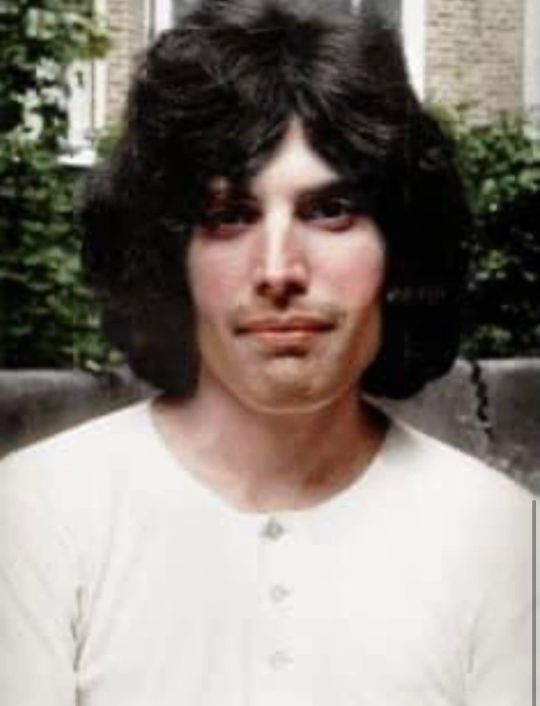


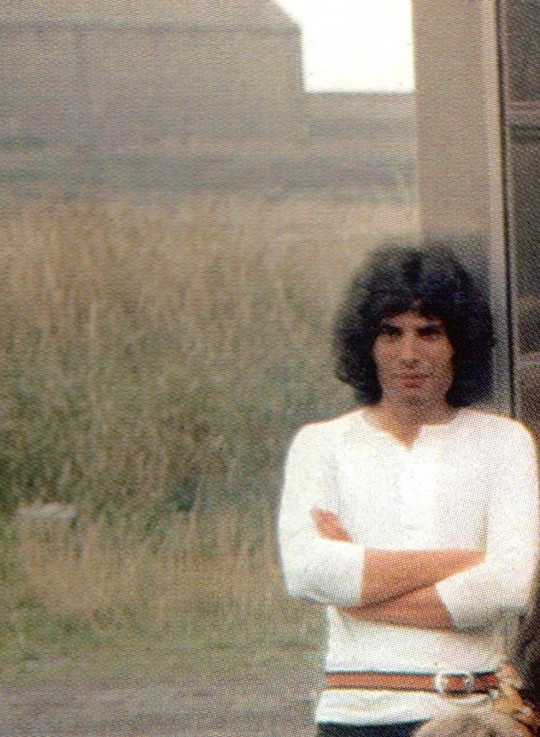
12 January 1964 - Freddie Bulsara and his family fled their home on Zanzibar Island due to political change and relocated to Feltham, near LondonHe was born Farrokh BulsaraFreddie Bulsara was born in Zanzibar's Government Hospital on 5 September 1946. His parents Bomi and Jer Bulsara were Parsees - followers of the Zoroastrian religion whose ancestors came from Persia - but they had lived in India.Bomi Bulsara came from Bulsar in Gujarat - hence the family name - and moved to Zanzibar to work in the High Court as a cashier for the British government.He married Jer in India and brought her back to Zanzibar. Farrokh, their first born, was followed six years later by a daughter, Karishma.Freddie's first cousin, Perviz Darunkhanawala, has said that the family had lived a fairly affluent life considering Bomi's civil servant wage. They lived in a comfortable flat overlooking the sea in Stone Town, the historic part of Zanzibar city, with its maze of narrow alleyways lined with shops, houses, bazaars and mosques. As well as domestic workers, they also had a nanny called Sabine.His first years of schooling were at the Zanzibar Missionary School, where he was taught by Anglican nuns.
But at the age of eight, his parents decided to send him to school in India. He went to St Peter's Church of England school in Panchgani, a former British Raj hill station south-east of what was then Bombay (Mumbai). Despite being a church school, St Peter's welcomed children of all faiths and Mercury was a fully practising Zoroastrian during his time there. It was during free time spent with his aunt and grandparents in Bombay that he discovered and indulged a growing love of music. He also formed his first band with friends, The Hectics.Freddie returned to Zanzibar in 1963 - the year it gained independence from Britain - and completed his last years of education at the Roman Catholic St Joseph's Convent School. In 1964, a revolution overthrew the ruling Arab elite, and as many as 17,000 people were killed. A republic was then established with the presidents of Zanzibar and Tanganyika, on the mainland, signing an act of union. They formed the United Republic of Tanzania with Zanzibar having semi-autonomous status.The Bulsara family, along with many others, fled the islands.The family moved to 22 Gladstone Avenue, a semi-detached home, in Feltham, west London in 1964 after leaving Zanzibar. Freddie was seventeen years old. They chose the area because Jer had a sister who already lived in Feltham.Mercury lived there on-and-off until about 1970. He crashed at various London flats between 1966 and 1969 while he studied for a Diploma in Graphic Art and Design at Ealing College and took various jobs to support himself, including washing dishes in the kitchens of Heathrow Airport, just a stone’s throw from Gladstone Avenue.Mercury’s mother, Jer Bulsara, recalls her son writing music during this time:“He used to write all his music before going to college, put it under the pillow and [tell] me not to remove any of the bits from underneath.”It was at Ealing College that he was introduced to the band Smile, whose members included Brian May on guitar and Roger Taylor on drums. At the unveiling of Mercury’s plaque, May, who also grew up in Feltham, recalled visiting Freddie at number 22:He had a Dansette record player and I distinctly remember him putting a Jimi Hendrix record on. He said ‘Listen to this, this is what we have to do!’ And I said to him, ‘Well, can you sing?’When Smile split up in 1970, Queen was born.Freddie’s sister, Kashmira Cooke said, “He secretly would have been very proud and pleased" to receive the honour.Yet everything was not straight forward for the family."The house had no central heating... We were not familiar with coal fires and had to be shown how to light it," Kashmira Cooke said.She said her brother spent much of the time in the house "sketching for his college art work" and "listening to music, particularly Jimi Hendrix"."He spent hours in the bathroom grooming his hair. At the time I wasn't best pleased as there was only one bathroom," she said.
25 notes
·
View notes
Text
Palestine Activists Are Planning to Besiege an Israeli Weapons Factory
“On 1 April, Palestine Action (PA) was only half-joking when it served Elbit Systems with an eviction notice. On 1 May, the group plans to occupy the Israeli weapons company’s Leicester factory for the second time in just over a year. Founded in July 2020 by a pair of longtime pro-Palestine activists disillusioned with polite resistance – co-founder Huda Ammori quit her job at the Palestine Solidarity Campaign after tiring of the NGO model of political campaigning – PA has earned a reputation as one of the UK’s most militant direct action groups. Andrew Feinstein, a South African anti-apartheid activist, arms trade expert and PA advisor, called the group ‘undoubtedly the most effective campaign against a specific arms company I’ve seen anywhere in the world’.
“The group’s sole target, Elbit Systems, is Israel’s largest private weapons manufacturer, which happens to have a major UK manufacturing base. PA’s preferred tactics are raids and occupations; images of its activists in red boiler suits and black balaclavas scaling and spraypainting redbrick buildings have become fixtures across mainstream media. Since launching, PA has occupied all five of Elbit’s UK sites, one of which the company sold off last January after multiple rooftop occupations; the company also abandoned its London HQ in the summer after PA activists occupied and defaced it. The Siege, which starts on 1 May, will see PA return to the Leicester factory they first occupied two years ago (activists were eventually removed by police after six days).
“At a time when many activists are feeling burned out by intensifying crises and relentless repression, PA keeps upping the ante. How do they do it? Feinstein attributes PA’s success in part to its laser focus on one target. Just as activists in his home country targeted Barclays and Royal Dutch Shell for their engagement with the apartheid government, rather than attempting to pressure the entire banking or oil sector, he says that PA has chosen its target ‘very cleverly’.”
#palestine action#occupation of palestine#free palestine#israeli occupation#israeli apartheid#israeli war crimes#shut elbit down#direct action#activism#anti-war#anti-war activism#elbit systems#stop the arms trade#arms manufacturers#arms trade#palestine#israel#middle east#arab world#uk#politics
6 notes
·
View notes
Text
Hi all! I'm here to show off another model!
This one was a little passion project that didn't really start until I realised I needed to complete a group of locomotives.
The London & North Eastern Railway's class A4s were the East Coasts most premier express locomotives. There are many models of this locomotive available across many gauges. In N gauge there is the old Minitrix model and the newer Dapol ones. In O gauge there are kits or the new ready to run Hattons model, in partnership with Heljan. And in OO gauge there is the older Bachmann model, the constant re-releasing Hornby Super Detail models and the Hornby Railroad model.
For what it is, the Hornby Railroad model is very good in quality. While the plastic moulding and the finish of the model makes it look very matt and bland, with the cheaper printed details not helping its case, the model is very well detailed, even with its moulded handrails and lack of features like lamp irons. Surprisingly, the model has brass fittings. Both the chime whistle in front the chimney and the safety valves embedded in the cab roof are turned brass, and stand out against the matt finish.
The reasoning behind wanted an A4 is because, within being on an Eastern Region kick, I have a Peppercorn A1 and A2, an A3 and to complete the group I wanted an A4. Luckily a mate of mine was selling a job lot to Rails of Sheffield with a Railroad Mallard and spare A4 body included. I offered a better price for it all, and that same day I got the models. My mate had previously modified the locomotive to have the Super Detail A4 valve gear, which did make the model look better. However, the A4 wasn't going to stay in "as purchased" condition for much longer.
Not long after I got home, after buying the models, I grabbed the spare body and attempted my plan of action. I cut the valances off of the spare body, using the inside of the bodyshell as a guide of where to cut, I scored a couple times down the valances before bending them out, making it easier to remove as the plastic on the Railroad models is softer than most models.
Because the cutting of the spare body worked out so well, I decided that I'd swap the bodies over and use the spare one on the final model. However one issue I faced with the spare body was the lack of chimney. Now that the original body was now spare, I removed the chimney off that body to put onto the spare one.
Other things that were changed to the body was the removal of the moulded handrails, addition of new ones using short handrail knobs and 0.45mm brass wire, and fixing any small mistakes on the valances with a file.
While I was detailing up the body the thought of "which A4 do I model" was crossing my mind. A lot of my Eastern Fleet worked all over the LNER. My A2, No.60538 'Velocity' has many pictures and videos of it working around York and Newcastle. The A3 I own is of No.60103 'Flying Scotsman' which worked all over the network in its lifetime. A lot of the smaller Eastern engines I own worked around Scotland or the South East. So when picking an A4 to model, it would be a preference to a name and which one was in similar condition to Mallard. In the end this was thrown out of the window.
Time for a little bit of Fake History!
The London and North Eastern Railway A4 locomotives are one of the most famous British Pacifics built. Its distinctive Streamlined casing of the 1930s giving a look of style and speed.
The original four A4s were nicknamed the silver batch because the names contained the word silver. Later batches would be named after birds but would later be renamed after famous and distinctive people. Originally the A4s were only going to have 35 members, however upon request from Kings Cross, a 36th member of the class was built on the 5th August 1938 and went around nameless until a name was decided.
4904 (the J39 doesn't exist) was sent to King's Cross as the last member of the A4s, fitted with a double chimney, as standard of the later batches, painted in LNER Garter Blue. The men at Kings Cross were allowed to choose the name, and after a number of months at Top Shed, it was requested for its name to be Thunder, a striking name for the last member of the class.
However the nameplates would never be fitted. In 1939, a year after the locomotive's construction, the Second World War broke out, and like other members of the class, 4904 was painted in a plain matt black, but didn't receive the NE lettering showing its home routes and allocations. Because of this, the locomotive was nicknamed "the Black Shadow" or "Eastern Ghost". 4904 roamed the network and managed to go to places such as Crewe, Birmingham and even Exeter during the war, making the engine become some sort of urban legend. The legend was enhanced when LNER 4469 'Sir Ralph Wedgewood', previously known as 'Gadwall', was blown up at York Sheds on the 28th April 1942. What started out as a nickname, 'Eastern Ghost' became a myth. Many workers mistook 4904 as 4469's ghost, while it went about its work at night.
When the war ended on the 2nd September 1945, 4904 was in a sorry condition. Two months previous the locomotive's axle boxes ran hot and were in desperate need of replacement, alongside this, the conjugated valve gear, which was built to be regularly maintained, was becoming worn due to a lack of maintenance. 4904 was the first A4 to be overhauled post war because of these factors. The axle boxes were striped and scrapped, new ones were casted and refitted. Parts of the valve gear that were salvageable from 4469 were used, but most of the rods were recast from new.
Finally on the 24th December 1945, 4904 emerged from Doncaster works. It was renumbered to No.35 and Finally received its nameplates, painted in a striking red. There were debates for the engine to take 4469's name of 'Sir Ralph Wedgewood' but another A4 was given the name (No.4466, later No.6, and later again to No.60006).
The locomotive throughout the rest of its life was Numbered 60035 and bounced about the East Coast performing duties on many of the named trains around the areas he was based at.
Having a majority of the locomitive's fake history written up, and out of boredom at the time, Thunder was painted I'm Wartime Black with the numbers painted on by hand with a toothpick in white. After this I realised I kinda copied the Sir Nigel Gresley 60007 trusts idea due to SNG currently wearing Wartime Black.
Thunder stayed in this condition for some time, I didn't have the nameplates or paint, so he sat in Black until they were ordered and arrived. Not long after arrival of the paints and plates, the locomotive was painted, lined, numbered and crested and was finally bestowed its name. Very fitting as it loosely followed his fake history.
Thunder, like Ryan, is a jewel in my fleet, sleek, shiny and unique. This project took me just over a month to do, and proves that, with minor modifications, that the Railroad Models can be bought cheap and made to look as good as the Super Detail Models available for double to price.
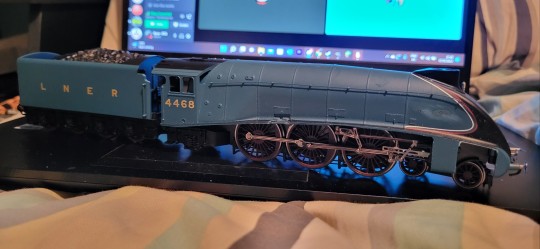

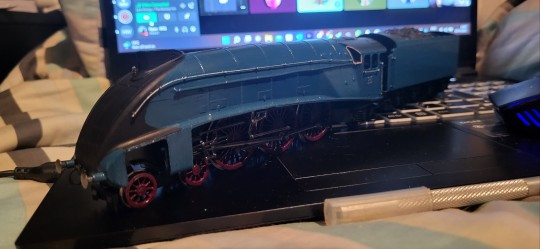



13 notes
·
View notes